February 19 - 25 2023: Issue 572
Country Women's Association Manly Branch Celebrates Its 100th Year - 1923 To 2023: Some History
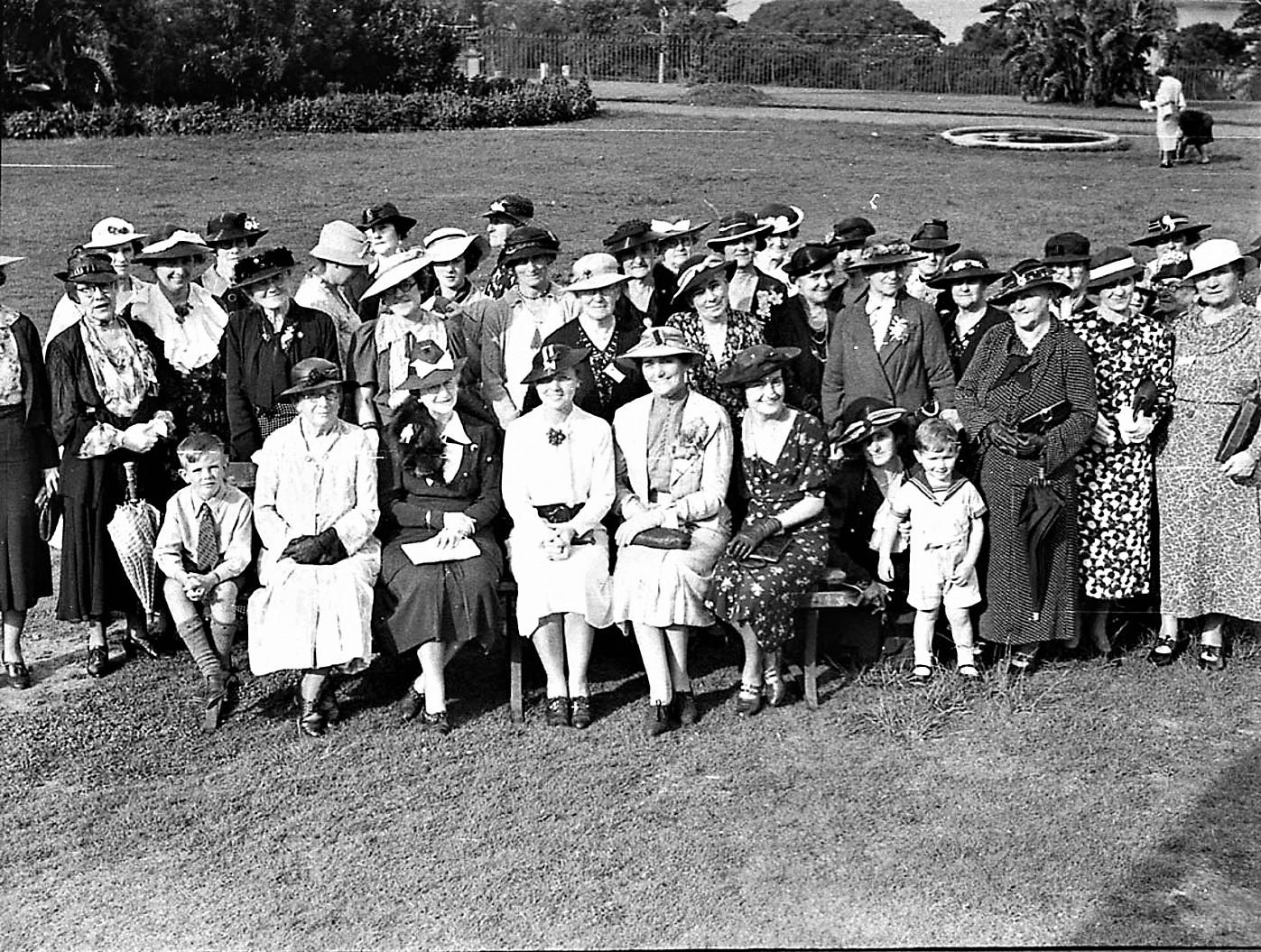
Our own local Branch of the Country Women's Association is celebrating its 100th year in 2023 with a great range of events and activities that are open to all residents from Manly to Barrenjoey.
Our area was once, along with Western Sydney, a food bowl for Sydney itself with many market farms and dairies persisting locally well into the 1950's and 1960's. This Issue, in a dual celebration with a Profile running on the Many CWA, we'd like to share a few insights into why the CWA was formed and how our local Branch helped in its founding years with its aims and objectives.
The Country Women's Association of New South Wales, was formed at the Bushwomen's Conference held in conjunction with the Royal Agricultural Show in Sydney in April 1922. This conference was initiated by Dr Richard Arthur, MP for North Sydney, and Miss Florence Gordon, who ran the Home Page of the Stock and Station Journal and penned the original Bushwomens Union articles.
Florence would later live at Ocean House/ Combers Newport and was living there in 1928 when she passed away. Florence Mary White Gordon, who was born in Tasmania, had actually been a founder of a newspaper at Tamworth and taught music there from 1910. One article found on a farewell for her in May 1918, when she was leaving Tamworth to come to Sydney, presumably to take up her work as 'Urbania' on the Stock and Station Journal, praised her 'literary style and intellectuality'.
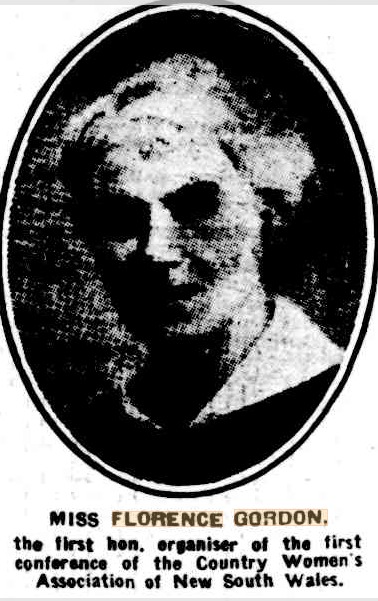
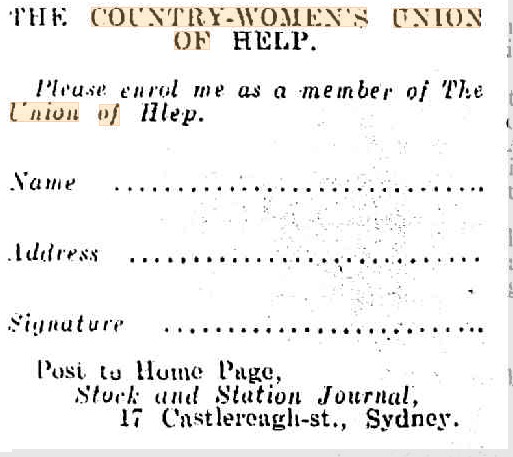
Mr. Arthur had been urging the need to improve conditions for rural women since 1904. An organising committee formed, including Florence Gordon and Mrs Grace Munro, wife of a wealthy landowner in Bingara, who was to become the foundation president. Miss Florence Gordon who wrote for the Stock and Station Journal under the pen name “Urbania”. Miss Gordon was supported in her efforts by the editor, Robert “Gossip” McMillan and Dr Richard Arthur, Member for North Sydney.
Florence had had published a plan for a 'Country Women's Union of Help' in 1921 which received a flood of support from her readers - a few passages from the pages of the past reveal:
OUR HOME PAGE
Conducted by 'URBANIA'
THE OUTLOOK OUR UNION OF HELP
A fortnight ago I wrote that I would put before you a scheme for Our Union of Help as a practical attempt in the direction of making Bush Life More Attractive to women. And remember that what is attractive to women is bound to make life more attractive to men.
First, then, in forming our Union, I want you to get your nine nearest neighbours to enrol by sending in your : names on the coupon on this page. Try and meet together and elect one of your number to act as honorary secretary for the ten. Give her your coupons, and let her send them along. (There is no need to spend 1s 8d in postage when twopence will do). They will be acknowledged in this page.
The group of ten can decide for themselves whether they will elect a president, when and how they will meet, and what their first objective will be. But each group should have a responsible lion, secretary to act on their instructions. When ten groups have been formed in one district, they can be affiliated in one branch with an honorary secretary for that branch, and a committee formed of one delegate from each group. The work of the branch will be to find out the wishes as regards aims and' objectives of the groups, and the local means and hindrances for gaining those aims. The ten branches would affiliate into a district which would have its own honorary secretary and a committee of ten, one delegate from each branch each district committee electing its own president. and two vice-presidents, and speaking with the voice of a thousand women. If each woman joining a group of ten had the vision to see, and the determination to bring into being a union of ten thousand women, they could look forward to a near future when many of the disabilities of the bush would be done away with.
AIMS OF OUR UNION OF HELP.
We cannot do everything at once. The particular thing the Union is to work for must be decided by the vote of its members. Some aims may be suggested. Better communications, i.e., better roads. Cheaper telephone and telegraphic communication. Cheaper motor cars, cheaper petrol Cheaper travelling facilities. Collective provision for maternity nursing, medical advice by correspondence, ambulance transport. Extension of High School and University systems. Cheapening of domestic laboursaving appliances.
A BIG ORDER you will say. Yes. But all these things will be added unto you by a strong union for COLLECTIVE PURCH ASING. That would bring you cheaper telephones, cheaper motor-car3, cheaper petrol. These, again, would bring you cheaper medical attention and nursing, cheaper transport to hospital. Collective Purchasing would bring you cheaper building materials, plans for house-building, cheaper laboursaving appliances, the books, gramophones, player-pianos, the domestic electric-power which with every fresh invention is bringing the town every day nearer to the bush. Remember, you have only to say a tiling often enough, _ and long enough, to seize every insignificant opportunity of getting what you want — AND YOU'LL GET IT.
You'll get it soon if you speak with the voice of a hundred women, and sooner still if you speak with the voice of ten thousand. Many women may think that most of the 'above-mentioned objects are beyond their understanding — and out of their reach. They may be — at present. But I propose from week to week to get the best available opinion on each object, with the best way of going to work to obtain it. Therefore next week I propose to lay before you the best available information on practical Collective Purchasing. In the meantime, will you all be sports enough to help forward this experiment to the extent of sending along your signature on the accompanying coupon. No doubt you will see difficulties — they are the easiest things in the world to see. Keep your eyes on the possibilities and you will turn them into actualities. THE UNION OF HELP. Please enrol me us a member of The Union of Help. Same ... Address . . . . . Signature ... Post to Home Page. Stock and Station Journal, 17 Castlereagh-st., Sydney. OUR HOME PAGE (1921, July 26). The Sydney Stock and Station Journal (NSW : 1896 - 1924), p. 3. Retrieved from http://nla.gov.au/nla.news-article123979414
BACK O' BEYOND.
'Far West' writes: — 'Some of your women writers seem to harp all the time on the amount of work to be done, especially that which the city housekeeper is fortunate enough to be able to miss, such as baking, dairy work, etc. Hard work, I grant you, and monotonous, but absolutely unavoidable, therefore not worth mentioning, except for purposes of comparison.
'Speaking from a woman's point of view, housework in the bush entails so much more labour than town housework, simply because it is the bush, and it is in the natural order of things that the bush housekeeper should have baking, butter making, and in hot weather the trouble of looking after at least several days' supply of meat, and endeavouring to keep that and other foodstuffs cool with the aid of canvas or hessian, water coolers, etc. And a hundred and one duties that never for an instant loom on the city housekeeper's horizon.
However, that is all in the game, and is an unalterable part of bush life, so hardly need come into this discussion. 'But why make such a drudgery of the work? I notice one of your writers speaking about washing with tubs outside in 'the heat of summer, and cold of winter. There are areas, and large ones, where brush is unobtainable ; but where there is timber, why not have a brush shed to wash in, with the opening on the east side; in fact, the whole of that side may be left open ... to a slight elevation, if possible— it does not take much of a fall to make water run- -a drain can be run from one corner of the shed, and where it enters the shed finished off with a. wood-supported sink lined with opened-up kerosene tins or any old tin about, and a bit of a schute of the same to start the water down the drain. There are many inexpensive ways or making the work easier, and they should be resorted to where and when possible, as the easier the work is made the less energy is expended, and the worker has more strength to go on with the next task. 'I am afraid the men folk are rather thoughtless in this respect. They have all sorts of appliances for labour and time saving outside for themselves, but a number of them quite fail to see why' the housewife should benefit in the same way, and are apt to consider anything required for the house as rather a needless expense, if not an extravagance. '1 consider one of the most essential things to make the bush more attractive is reduced postal rates on books. 'I live west of the Darling (I think Sydney side hardly recognises this as part of N.S.W.,: but if any of your readers are doubtful they can look up this district on the map and will find it in N.S.W. sure enough). Our nearest town is 60 miles away, our nearest railway 50, our nearest neighbours 18, our last visitors two months ago; our next — well, now I have no idea.
'A munificent Government generously gives us one mail a week, and last December, 12 months the said Government, in a sudden desire for economy — which is a science they apparently don't understand — all but took away this one link of ours with the world at large.
'However, to return to books: The general run of country people, whether they have had the advantage of a good education, or can just manage to read and write, enjoy reading.
We have not the advantages of city folk in being able to attend lectures on different things in which we may be interested, or in discussing different subjects with people of diverse opinions. 'Buying books, either for the purpose of studying a given subject, work; of travel, or fiction, is a pretty expensive game, and not many can afford it, so turn to the libraries for their books. Most library rates are well within reason, and if the subscriber furnishes the library of his choice with a list, of books he or she desires, or favourite authors, most of them will do their best to accommodate. 'Then comes the postage. It costs 2s to 2s -1d on a parcel of three books from Adelaide here and back. Of course one might get larger parcels at a time by rail; but, then, there would be the rail charge, carriage from railway station to coach office, and coach rates, so I am afraid that would not work.
'Where the town people have the advantage of free libraries, lectures, night schools, etc., where they may improve their minds when the day's work is done, their poor country brethren have nothing but prohibitive rates on reading matter.
'When one has been working hard all day they need some relaxation. Cards are all very well, but one must sit up and take notice, and what one really needs is just to settle down comfortably in one's favourite chair, with a book for company. A woman may sew, but the chances are she has done a quantity of household sewing during the day, so it would be no relaxation for her to ply the needle. 'Of course one may toil from early morning till late at night, and there is usually time to fit in one or two little jobs that were unforseen; therefore, there should be time, too, to fit in a little recreation, and as we country folk are a hard-working people, what better than reading, one is learning and resting at the same time. 'I see a number of your correspondents advocating cheaper telephone rates, and I am with them every time. Three minutes for 8d is bad enough, but that is quite a low rate comparatively, and on lines that probably don't average more than a couple of dozen calls a day. We are not connected by telephone to our town, but to the post office at our nearest railway ; so we may send and receive telegrams, but there is no doctor there. Surely in cases where the postmaster's house and post office at our nearest railway; so we may country towns, it could be arranged that the postmaster should answer the telephone on Sundays and holidays, double or treble rates being charged the caller, so that they would only ring up in cases of urgency, such as sickness, accident, or any like matter.
Where a doctor has to travel anything up to a hundred miles or more on bad or indifferent roads, every hour's delay in getting word through means, perhaps, the safety or loss of a life. Tragedies of this kind are, unfortunately, not altogether rare. 'Personally, I love the bush in spite of all its drawbacks far better than the town; but there are many ways in which life out-back could be improved, and surely the Governments that do so much for the city people might help. Considering that most of their revenue comes from the country it seems only a fair thing to ask. BACK O' BEYOND. (1921, July 29). The Sydney Stock and Station Journal (NSW : 1896 - 1924), p. 4. Retrieved from http://nla.gov.au/nla.news-article123988870
THE COUNTRY WOMEN'S UNION OF HELP
You will see that I have slightly altered the name of our Union. It is meant to interest and help countrywomen — the country-women who read the Stock und Station Journal, and look to it to help them. So for the future all the news and business of our Union will be found under the heading at the top of this column.
THE PLAN OF THE UNION.
Last week I told you of the plan for the organisation of the Union, but some readers may have missed it, and new readers may have heard about it, and want to know more about it. The first step to be made is to form groups of ten members or more. Ten who are at least within touch of each other, (let them to sign a coupon, the one at the foot of this column). Then agree on one of the group to act as hon, secretary and let her post the coupons. It would perhaps be a good thing for each member of the group to pay a shilling a year membership fee to the hon, secretary to cover such expense as postage. Until a number of groups have been formed, we can hardly look upon ourselves as a Union, so I do hope those of you who read this page will help the project along Informing or joining a group.
I want to be able to publish very shortly the names of quite a number of groups and their members in this column. Then will those who enrol, and those who think of enrolling, every week cut out and keep for reference The Country-women's Union of Help column. Where it is possible for the members of a group to meet, it would help them to read over each column that has appeared since their previous meeting, and direct their hon. secretary to write for information on any question that arises.
Human companionship and social ties seem to be the great wants of bush life, according to many of the correspondents who have taken part in the recent discussion on making Bush Life attractive. Here the Union of Help groups could do a great work. If distance is not altogether too great, the members could arrange a fortnightly or monthly meeting at each other's homes, and dunce, play cards, or tenuis, or golf. The main thing is to determine in however simple a way to break the monotony, and recognise that all work and no play makes Jack a dull boy.
Don't forget the children. Get them together. Give them an afternoon sports, and let the grown-ups vary the amusement with a race or competition.
And when you have broken the dull round, and found out that if you try you can get together and enjoy each other's society, write to the Union of Help column and tell us all how you did it. Even in the simple matter of a sociable afternoon and evening, each of you can 'leave footprints on the sands of time' that some lonely, dispirited dweller in the bush may see and determine to do likewise.
Some of you may say you are so far away you cannot be one even of a group of ten. Never mind. Find out nine other people as lonely and far away as yourself, and form a group for correspondence. Still have one for an hon. secretary and centre. Let each one hunt up an interesting book, or a game, or a gramophone record, and keep passing them round till they come back to the owner. If all the group haven't gramophones, you'll find they'll each be getting one and enjoy the change and interest got by exchanging the records. Say to yourselves that you will keep in touch with human beings; take every opportunity that offers.
Last week I promised to say something on the subject of Collective Purchasing by which I believe the conditions of women in the country could be greatly improved. Owing to unforeseen delay the material for the paper was delayed. And it would perhaps be better to wait for a couple of weeks until there has been time to publish the formation of some groups.
Will readers send in their names, and also, if possible, mention some of the special needs or wants of their group and neighbourhood.
THE COUNTRY-WOMEN'S UNION OF HELP. Please enrol me as a member of The Union of Help. Name ... Address ... Signature ... Post to Home Page, Stock and Station Journal, 17 Castlereagh-st., Sydney. THE COUNTRY WOMEN'S UNION OF HELP (1921, August 2). The Sydney Stock and Station Journal (NSW : 1896 - 1924), p. 3. Retrieved from http://nla.gov.au/nla.news-article123986387
THE COUNTRY WOMEN'S UNION OF HELP.
This Union has been formed with the object of strengthening the position of women in the country, of helping them to express their views, and of taking concerted action to gain their ends.
The strength of such a Union lies first in the active enthusiasm of the members, second in the numbers. Every reader of the Stock and Station Journal is invited to become a member by filling in and posting the accompanying coupon, for though the Union is mainly to help women, there is no reason why men should not give their help by joining. Two or three members can form a group with an hon. secretary for correspondence, meetings, and so on. It is advisable that the number of a group should not exceed ten. Ten groups form a branch. There is no fee for membership of the Union, but each group might subscribe one shilling each towards expenses, stamps, etc. THE COUNTRY WOMEN'S UNION OF HELP. (1921, October 7). The Sydney Stock and Station Journal (NSW : 1896 - 1924), p. 3. Retrieved from http://nla.gov.au/nla.news-article125389580
And then Florence ran:
THE BUSHWOMEN'S CONFERENCE.
It is to be hoped that every one — not only those interested, but all those who are going to be interested in The Irishwomen's Conference have read the article by Miss Helen Souter in last Friday's issue. It is just the sort of encouragement that those of us who are working for this conference, who believe that it is going to be immensely helpful to every one taking part in it — want to get.
A week or two back we gave details of some of the arrangements that have been made up to the present. Letters from country readers help us very much, because they show us the lines on which country women are thinking and talking, and enable us to plan some lecture, entertainment, or exhibit on those particular lines. One of the features of the Conference will be, we hope, the exhibits of articles which will add to the comfort, and lessen the labor of the country home. It may not always be possible to obtain these things at once, but if they are brought to our notice, we can at least think over their pros and cons, and adapt some of their notions to our own uses and ideas. If we have some notion of the things women most want we can take care to give exhibits that may help them. The exhibition part of our Conference ought to be quite as helpful as the talking part of it. THE BUSHWOMEN'S CONFERENCE. (1921, November 15). The Sydney Stock and Station Journal (NSW : 1896 - 1924), p. 3. Retrieved from http://nla.gov.au/nla.news-article125391140
The Bushwomen's Conference was highly successful and attended by hundreds. Lectures were given on infant care-an important topic for women without the medical facilities or baby health centres enjoyed by city women-and dealing with insects, while Florence Taylor, Sydney's only woman architect, talked about practical rearrangements of the home to increase comfort, such as insect screens. On the second day, the floor was thrown open to general discussion. The women who attended were 'ordinary' rural women, who were in the city for the Show.
The brief of the new Association formed out of the conference was simple: to improve the conditions of women on the land. They adopted the motto 'Honour to God, Loyalty to Throne, Service to the Country, Through Country Women, For Country Women, By Country Women.' Their immediate objectives were to secure reduced train fares to the coast in summer, to get support for a seaside home and have maternity wards in country hospitals.
The following excerpt is from our history, “Serving the Country”, written by Helen Townsend.
“My wife is slowly dying before my eyes…we can’t get help for her. She won’t leave me and the boys and take a spell in the city’…In many rural areas…there was no community organisation and no facilities to support a family in distress. The Country Women’s Association came into being to fulfil this need and to enrich the lives of country women and their communities.”
The Association was inspired partly by the Women's Institutes established of Canada and Britain although locally, Manly CWA branch foundation members had also been active in WWI and afterwards meeting the needs of Australian soldiers sent to serve and were also, in some cases, speakers at the newly formed Feminists Club.
A little about that Bushwomen's Conference that commenced the Country Women's Association:
WOMEN'S COLUMN.
TOWN AND COUNTRY.
WOMEN IN CONFERENCE.
What may resolve into a big movement throughout the State began yesterday at the Country Club, Castlereagh-street, at the Open Conference of Country Women. The primary object of the conference is to bring about a better understanding between city and country women, and to give to the latter a greater knowledge of the the and needs of the woman on the land. With an extensive immigration policy, and general movement for decentralisation, it is absolutely necessary that the interests of the women who will be helpmates for the men on the land should be fully considered. It is hoped that as an outcome of the conference, which will last all the week, clubs will be formed in country towns which will later be linked Into a Federal organisation.
Dame Margaret Davidson opened the conference yesterday morning, when there was a large attendance. The Countess of Stradbroke accompanied Dame Margaret, and also at the table was Mrs. Hugh Munro, the president, and Miss Florence Gordon, the hon. organising secretary. In her presidential address Mrs. Hugh Munro said that among the many reforms needed to improve conditions of women on the land were: Reduced railway fares and freights; sleeping berths and better travelling accommodation for women and children; maternity wards in hospitals; extension of the bush nursing system; the supply of electric power, where practicable, for domestic purposes. Mr. J. K. Powell, who was the principal speaker at the morning session, then gave an address on "The case for the woman on the land." He gave a graphic description of the life of the average bush woman, and the apparently small recompense she got for her life of self-sacrifice and hard work. He denounced centralisation, and said that everything should be done for the out-back mothers.
At the conclusion of his address, Mr. Powell moved the following resolution:
"That a deputation be appointed from this conference to wait upon the State Government to (a) ascertain what measures can be taken, under present unwieldy methods of control, in regard to the fullest extension of the bush nursing scheme; the institution of an ambulance service on a properly organised zone system, and the opening of maternity wards in every Government hospital, (b) Plead for the earliest possible introduction of a bill for the subdivision of New South Wales into smaller States for the purpose of commencing the great task of decentralisation."
Mrs. Mackinnon contended that the second part of the resolution had a political tone, and recommended that it be omitted. The discussion then centred on things political, so Mr. Powell withdrew his resolution.
The Lady Mayoress presided at the afternoon session, when Miss Williams (Baby Clinics) read Dr. Margaret Harper's paper on "Infant Welfare." Dr. Harper was unfortunately detained in the country. Dr. Selwyn Harrison, Dr. Harvey Sutton, and Dr. Blexley took part in the subsequent discussion.
At the evening session, at which Mrs. R. R. S. Mackinnon presided, Mrs. Florence M. Taylor gave an address, illustrated by lantern slides, on "Comfort in the Country Home." Mrs. Taylor extolled the heroism of the pioneer mothers, whose early self-denial and loyal service, she said, had developed in the Australian that unconquerable spirit that was such a revelation to the nations of the world during the war. Country homes were not all unattractive and comfortless, but generally speaking domestic labour could be much simplified by more careful planning or by me-chanical devices to replace human activity. Designs of suitable and convenient homes were illustrated, and Mrs. Taylor, who is an archi-tect, gave many helpful hints and suggestions for the benefit of her audience.
The audience was largely composed of country women, many of whom will take part in subsequent meetings.
The conference will continue to-day. The morning session, at 10.30 o'clock, will open with a talk by Mrs. Stephen Laver on "A Day in a Country Woman's Life," Mrs. Laver, now a resident of New South Wales, was the first president of the women's section of the Victorian Farmers' Union. Mrs. Riseigh is the present president, and Miss Rose Curry the organising secretary. Miss Hilda John-ston, representing the Moree Women's Club, and several Queensland visitors, will address the meeting, and the question of organising women's country clubs will come up for discussion. Mrs. MacCallum, president of the National Council of Women, will take the chair, and topics concerning citizenship in different aspects will he discussed. In the evening an interesting lantern lecture on "The Insect Menace to Rural Life" will be given by Professor Launcelot Harrison. Mrs. Frank Chaffey will preside. WOMEN'S COLUMN. TOWN AND COUNTRY. (1922, April 19). The Sydney Morning Herald (NSW : 1842 - 1954), p. 8. Retrieved from http://nla.gov.au/nla.news-article15998888
The following month:
COUNTRY WOMEN'S ASSOCIATION.
Sir,-May I draw your friendly attention and that of your readers to the Country Women's Association of New South Wales, the outcome of the recent Conference of Country Women, held in Sydney during Easter week. This association has been formed to voice the country woman's point of view, her needs, her hopes, her wishes, the small beginning of a great movement, that will enable her to laugh more at her work that work which makes life possible to the man on the land, who Is the base and backbone of the nation. Worthily she is the mother, sweetheart, wife, sister of "the bravest thing God ever made." He Is willing to give her all the help she needs-if he only knows how.
The Country Women's Association seeks to make the country woman articulate. To woman organised all things are possible. The association alms at organising every woman in the State outside the metropolitan district of the county of Cumberland, and primary producers within It, or those directly deriving their livelihood from the land. It is an independent body, without political, religious, or financial backing. It relies on the justice of Its cause, the sympathy and support of those who realise Its great possibilities. Its motto covers both Its reason for existence and Its platform of work. Loyalty to the Throne, service to the country, through country women, for country women, by country women. That service embraces a wider range, from that supreme service which gives a strong and virile race to carry on the work of the nation, to helping some lonely woman or child outback to enjoy some of the pleasant things of life. Between these extremes lie organised help to charities, bush nursing, the establishment of maternity wards ix hospitals, municipal and shire council work. For thinking women all agree that It is high time we followed the example of our English sisters, and took up municipal and local government work.
The provisional officers of the association are Mrs. Hugh Munro, president, Keera, Bingara: Mrs. Sawyer, Bethungra Park., Bethungra; Mrs. A. J. Studdy, Doggabri; Mrs. Stephen Laver, Grabben Gullen, Goulburn: Mrs. Hazlett, Gulgong, hon. treasurer, and myself, hon. secretary.
We invite all women In sympathy with this movement to endeavour to form branches of the association In their locality. In the larger towns to invite the Mayor to call public meetings, In smaller townships to hold meetings, form branches, end decide their own plan of work. We believe that small groups, even of two or three, would prove more congenial than one big branch in every district. We shall be pleased to forward rules and membership books to any woman who will undertake the work of forming a branch, with any information in our power that is likely to render help. We appreciate any inquiry by which we may render that service in each other which Is the basis of our association. FLORENCE, GORDON, Hon. Secretary, Country Women's Association, 17 Castlereagh-street, Sydney. COUNTRY WOMEN'S ASSOCIATION. (1922, May 19). Newcastle Morning Herald and Miners' Advocate (NSW : 1876 - 1954), p. 3. Retrieved, from http://nla.gov.au/nla.news-article139340565
City and Country
DR. RICHARD ARTHUR. A FRIEND OF THE PRIMARY PRODUCER.
When making his first speech. eighteen years ago, to the electors of North Sydney, Dr. Richard Arthur stated that if elected he would be a representative of primary producers, because he believed that by serving them he could best serve his own constituents. All through the intervening years, he has stuck sincerely to that big built-on-rock belief.
It would be a better-off State today if more of the metropolitan Members of Parliament were possessed of like visions. Develop the country and the city will grow aright. For many years, the 'Stock Journal' has known Dr. Arthur well, and it is pleasurable to pay this tribute to a man who has worked so ably to serve the country.
BUSH WOMEN'S CONFERENCE.
It was Dr. Richard Arthur, M.L.A., who started the discussion on How to Make Bush Life Attractive. No correspondence in the 'Stock and Station Journal' has ever attracted keener attention or a better response in the form of letters to the Editor, from readers. Out of this discussion comes the Bushwomen's Conference, which will be held in the Country Club at Easter time, under the patronage of Dame Margaret Davidson, and the presidency of Mrs. Hugh Munro, of Keera, Bingara.
There never has been such a conference before in Australia, and women in other States, as well as in New South Wales, are taking notice. Dr. Arthur should be proud of the results of his efforts in this direction. Come to think of it, Dr. Arthur al-ways has been a champion of country interests. He recognises yery clearly that everything depends in the final analysis on the country, that the city can prosper permanently only if the country prospers, and that the country people have never got a square deal. He knows that unless the country is made more attractive, that unless life on the land is made more comfortable for the moil, women, and children there, especially the women, the State cannot go ahead. All economic health comes from the land. A REMARKABLE LIST.
And so we find that he has ever been a consistent and able advocate of country advancement. Although representing a metropolitan electorate, he can claim to be a 'country' member. As there are many retired country men living in his electorate, at Manly and Mosman, they might make a note of it.
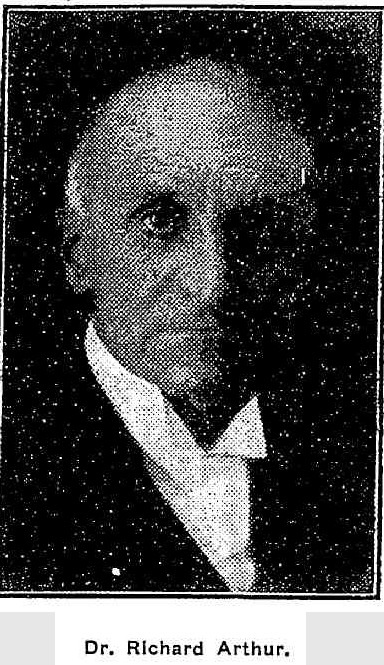
Dr. Richard Arthur.
Read this list of his country services.
1. First speech in Parliament on Closer Settlement, 1904. 2. Visited Myall Creek, Gobogambin and Marrar, 1905, and wrote articles on Closer Settlement in 'Herald.' 3. invited to open discussion on Closer Settlement at First Closer Settlement Conference at Corowa, 1906. 4. Started Immigration League, 1906. 5. Started Training Farm for City lads and immigrants, 1907. 6. Have visited frequently Agricultural Colleges in the State, and written articles on them advocating extension, and urged this in Parliament. 7. Went over route of North Coast Railway, 1906, and urged Decentralisation by East-west Railways. Opposed North Coast Railway in Parliament. 8. Visited Great Britain at own expense in 1909 for immigration purposes. 9. Brought the Scottish Agricultural Commission to Australia. 10. Visited by himself Pilliga scrub, Tumbarumba, Batlow, etc., 1910, and wrote articles on need of railway communication. 11. Visited Murrumbidgee settlement four times, and wrote press articles. 12. Started Voluntary Workers' organisation, 1910, which spread all over the State. Many soldiers helped to clear land, build homes, fence, etc. 13. Visited wheat stacks and wrote articles, 'The Tragedy of the Wheat,' which concentrated attention on wheat plague, 1917. 14. Started successful agitation to force Federal Government to take ships off coast, and carry produce to Europe or America. 15. Took party from Farmers and Settlers' Conference to Port Stephens decentralisation and wrote it up, 1914. 16. Started 'How to Make Bush Life more Attractive' discussion.
It is a notable record! And Dr. Arthur is keener to-day than ever on country interests — he is ever socking fresh fields for his unstinted services. It may be mentioned here that Dr. Arthur's only son, Lieut. Bruce Arthur, who was Dux of the Hawkesbury College in 1912, was before enlistment on the land, and was wounded and gassed in France. So that altogether the Doctor's association with the land has been close, constant and personal. City and Country (1922, February 24). The Sydney Stock and Station Journal (NSW : 1896 - 1924), p. 4. Retrieved from http://nla.gov.au/nla.news-article125385457
While initially largely ignored, as the association grew it gained considerably lobbying power with politicians. This was women advocating for women.
They were fighting isolation and a lack of health facilities, mostly non-existent in some rural areas. The members worked tirelessly to set up baby health care centres, fund bush nurses, build and staff maternity wards, hospitals, schools, rest homes, seaside and mountain holiday cottages - with the first Seaside Home achieved here.
Country Women's Association
WOMEN AND CHILDREN FIRST HOLIDAYS AND HOSPITALS.
Although the first conference of the Bushwomen is only just over, no time is being lost by the Country Women's Association in getting to work. There is much to do, and there is nothing like an early beginning.
As readers already know, a deputation from the Association waited on the Minister for Railways, Sir Thos. Henley, and asked for a number of things — including more convenient excursions for women and children, second class sleepers, and better arrangements for the getting of refreshments en route. Speakers also stressed the fact that rail fares far out are becoming prohibitive. Sir Thomas Henley was sympathetic, and there is good reason, to believe that the reforms suggested by the Association will come about.
SEASIDE CAMPS.
Mrs. Hugh Munro, the President of the Association, has been in touch, with the Minister for Lands, Mr. Wearne, with a view to securing land for seaside camps. The idea is to provide these camps by the seaside for outback women and children, so that they will be able to get accommodation free. The matter of accommodation is a big item to the outback settler's family when they are dreaming of a holiday by the seaside!
Mrs. Munro is planning to secure land somewhere on the North Coast, probably near the Clarence River, for one camp, land on the South Coast, probably at Jervis Bay, for another camp, and land about Sydney for the third camp. For awhile' probably only the Sydney camp would be of much service, because, as things are, all rail-roads lead to Sydney.
Later on, the other camps will be used — especially when decentralisation comes. It is suggested that a camp site could be obtained at Griffith Park, near Collaroy, a few miles north of Manly. This would be an excellent site because there are one hundred and seventy acres of land there and both water and gas are laid on.
On one side there is Dee Why Lagoon, on the other side is the splendid Collaroy Beach, and in front is the health-giving Pacific. Probably this is the best site for the purpose in the metropolitan area.
Mrs. Munro hopes that the camp here will be ready for next summer. What a Godsend it would be to the tired bush mother and her children !
NURSES.
Another matter that the Association is attending to at once is outback nursing, and the registration, of maternity nurses. Mrs. Munro has been informed that a bill has already been drafted for the compulsory registration of midwives and the hope is that this will go through early. Better provision for bush nursing is also desired. It is hope, by working in conjunction with the Children's Welfare Association, to arrange for the sending of capable teachers to country towns to spread instructions in the feeding and general care of children. Infant mortality is at least as high in the country as it is in the city in spite of the fact that disease is more prevalent in the city.
More country than city mothers die in child birth, owing to the lack of proper ; attention in the country ! The Country Women's Association will strive to get better attention for the bush mothers and their children.
It is hoped to secure an annex department to each country hospital, where young children, who are not ill, can be kept and properly looked after while the mothers are ill. it is also hoped that provision will be made in the country towns for the keeping of ambulances, that in the case of sickness or emergency will go out into the country and fetch the patients in — at present one of the great difficulties often lies in getting the patient into town.
These are just a few of the matters that are receiving the immediate attention of the Association. It is hoped that thousands of bush women will join the Association, and so make it a great factor for good, in the lives of the bush community.
If you are interested— and if you are a bush woman surely you are - please write for further particulars to the Secretary Country Women's Association, c/o '. Stock and Station Journal,' 17 Castlereagh Street, Sydney.
As a postscript it may be added that the Country Women's Association is wholly made up of country women. Women living in the city whose main income is drawn from the country are eligible for membership. This is an association of country- women run by country women for country women. Country Women's Association (1922, May 5). The Sydney Stock and Station Journal (NSW : 1896 - 1924), p. 4. Retrieved from http://nla.gov.au/nla.news-article125388447
Grace Emily Munro (née Gordon, 25 March 1879 – 23 July 1964) was an Australian World War One volunteer, charity worker, and founder of the Country Women's Association. Born on March 25th 1879 in Warialda, New South Wales, Australia, Grace was the second of George Hollinworth Gordon's seven daughters. She received her education from a governess at Kambala, Sydney. Grace was an accomplished horsewoman, an exceptional needlewoman, and a knowledgeable gardener.
On July 14th 1898, Grace married 36-year-old Hugh Robert Munro and they had three children together. Her youngest child died in 1911 while Grace was away in Sydney with another child who was having an emergency appendectomy. Because of this experience, Munro became determined to improve the conditions of and the availability of medical help for all women and children in the country.
Living mostly in Bellevue Hill during World War One,[2] Munro held the position of Honorary Organizing Secretary of the Australian Army Medical Corps and worked for the Australian Red Cross Society. During the war, she became qualified in first aid, home nursing, and hygiene at St. John Ambulance Association under the training of Sister A. B. Perry. Grace Munro helped organise facilities at the Sydney Showground for country volunteers and ran the post office there. She was also responsible for transporting the weekly supplies to army camps around Liverpool.
In 1922, Munro was one of those who held the first Country Women's Association (CWA) conference over three days during the Sydney Royal Easter Show and was subsequently elected as its president. She travelled throughout New South Wales and Queensland to help form branches of the association.
By late 1923, sixty-eight branches, seventeen restrooms for mothers and children, two seaside homes, and maternity centres in many towns had been established. She helped found a rest-room in Bingara in 1924 as well as the first country baby health centre in Moree. By 1926, when she retired due to illness, there were 100 CWA branches with a membership of 4,500.
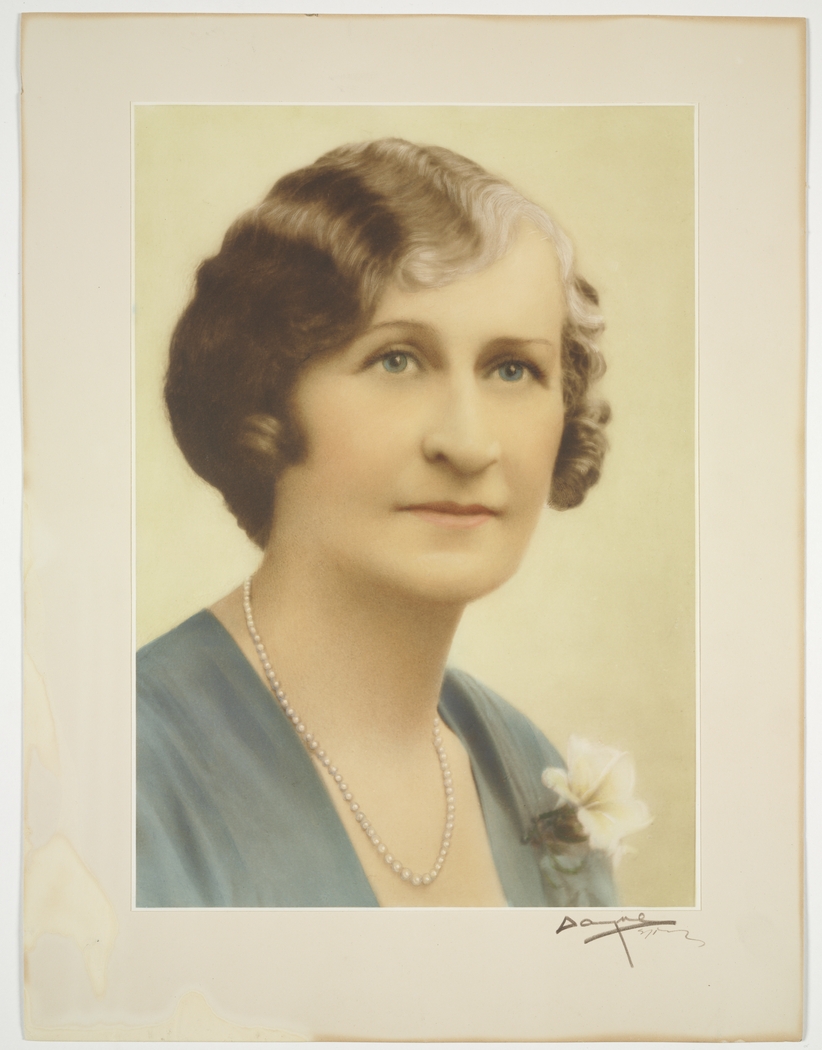
Grace Munro, photo courtesy NSW State Library, Item: a5295001h
A few local notes on the commencement and early works of our local branch include a number of firsts:
MANLY COUNTRY WOMEN
Mrs. Cecil Tindale, of Muswellbrook, called a drawing-room meeting at her flat at ‘’Dungowan" Manly, yesterday afternoon, to discuss the formation of a sub-branch of the Country Women's Association at Manly.
Mrs. James Ashton (president of the Cumberland branch) explained the aims of the association and the particular work it was hoped, that Manly would undertake, which was a special interest in the seaside camps, the first of which would be opened in the summer.
Among those who attended the meeting were Mesdames Earle Page, Keirle (Mayoress of Manly), Osbourne-England, H. C. M'Intyre, R. W. Weaver, Ness, Dunn, G. Wolford, Marion Irvine, and Miss Barrett. MANLY COUNTRY WOMEN (1923, May 31). The Daily Telegraph (Sydney, NSW : 1883 - 1930), p. 3. Retrieved from http://nla.gov.au/nla.news-article245821578
Mrs 'Cecil' Tindale was actually Claire nee York, a native of Singleton and Muswellbrook where her father was a horse specialist. The Tindales had been coming to Manly for years for holidays. They lost their only son, Dallas Ambrose, in France 1918 during WWI. Mrs. Claire Tindale had been among those doing 'war work' though:
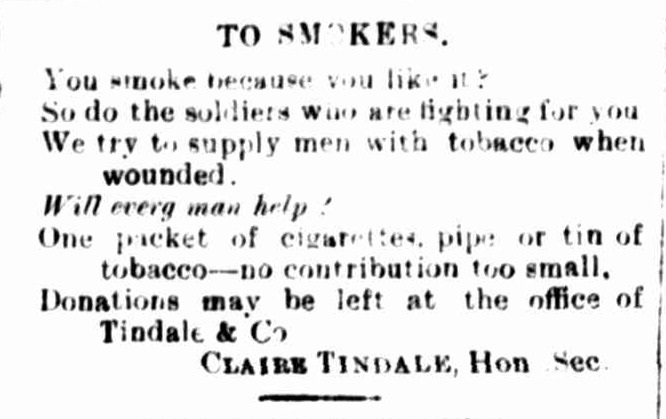
TO SMOKERS. (1914, December 5). The Muswellbrook Chronicle (NSW : 1898 - 1955), p. 2. Retrieved from http://nla.gov.au/nla.news-article107872855
The Manly CWA was officially formed in June 1923:
COUNTRY WOMEN'S ASSOCIATION
At the Dungowan Cafe, Manly, a meeting convened by the Mayoress of Manly (Mrs. A. T. Keirle) formed a sub-branch of the Country Women's Association. Amongst those present were Mrs. James Ashton, O.B.E. (president or the Cumberland branch), Mrs. N. C. M'Intyre (hon. treasurer). Miss Wurby (hon. secretary), Mrs. Irvine (organising secretary), Mrs. Cecil Tindale, Mrs. Osborne (England), und Mr. it. D. Weaver. M.L. A.
The following officers were .elected for the Manly branch: — Patroness. Mrs. A. T. Keirlo (Mayoress); president, Mrs. C Tindale; vice-presidents. Mrs. Osborne and Mrs. H. D. Weaver: hon. treasurer, Mrs. Ness; Hon. secretary, Miss Martin; committee. Mesdames Dunn, Welford, Henderson. Chapman, Minnett, Forbes, Young. Davis, and Robertson. A musical programme was contributed to by Misses Lily Laing, Freudenstein, Granger, Beard, and Bell. COUNTRY WOMEN'S ASSOCIATION (1923, June 15). The Daily Telegraph (Sydney, NSW : 1883 - 1930), p. 5. Retrieved from http://nla.gov.au/nla.news-article245818540
In June 1924 the CWA Manly Branch was officially formed and ratified by the head office in July of that year.
This is a great example of how this branch was created and who were the leading women in positions for CWA Manly branch:
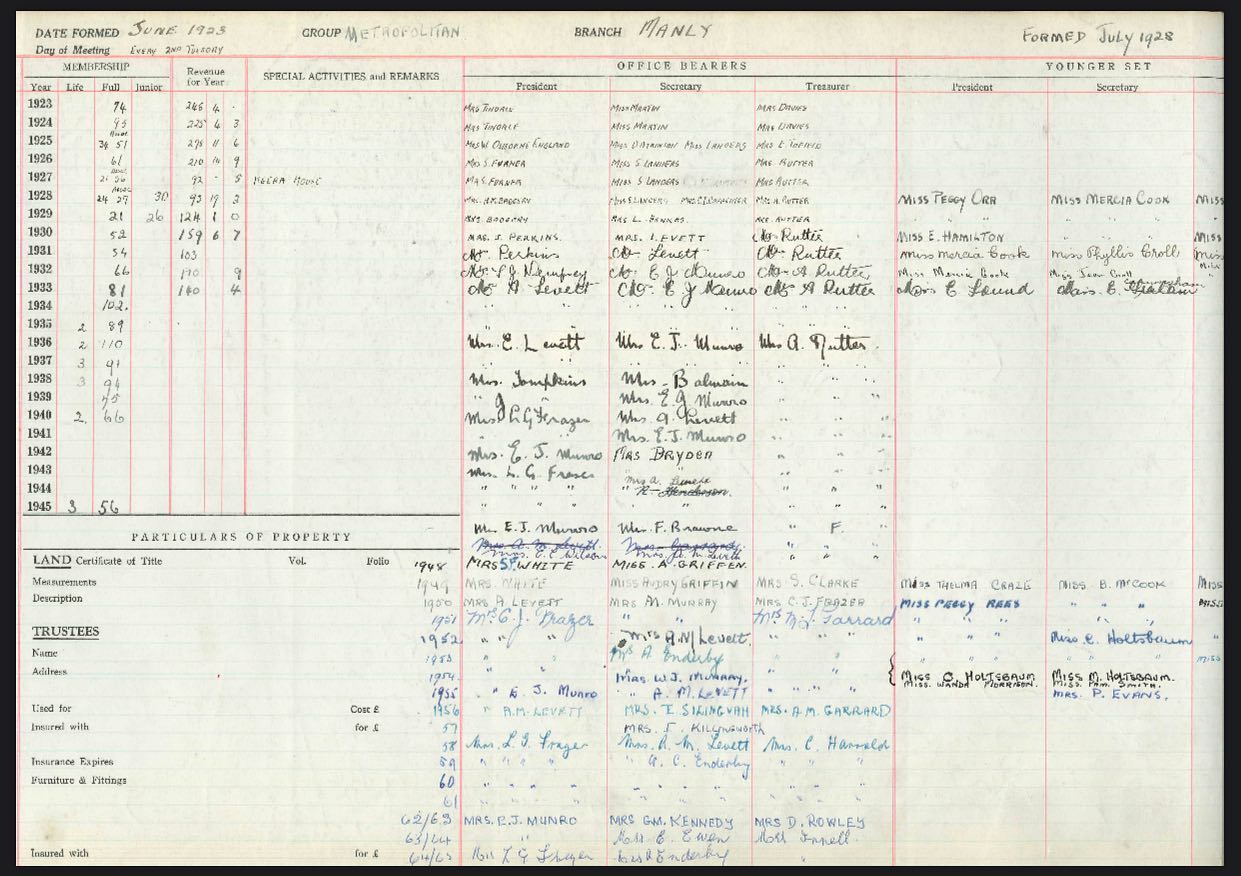
MANLY POLO DANCE.
To the Manly Sub.-Branch of the Country Women's Association belongs the credit of firing the first shot for the Seaside Homes Fund in the metropolitan area! In the charmingly arranged at Dungowan Café on Tuesday evening,, there was a fine attendance, and dancing was kept up with great spirit. To- the great regret of all, the President Mrs. Tindale, was prevented by illness from being present, but the Vice-Presidents, Hon. Treas. and Hon. Sec. were untiring in their efforts to see to the enjoyment of all. There is a splendid jazz, band at Dungowan, and the system of lighting is both pretty and novel, and under the variegated rays the pretty frocks looked most effective. Mrs. Osborne England wore a French frock of silver grey brocade and silver, and Mrs. Nest was in black satin, relieved with gold. Miss Martin chose a graceful frock of lettuce green, draped and finished with choux of the satin. Mrs. Ross was in deep crimson charmante, the long waist-line defined by gauging. MANLY POLO DANCE. (1923, July 10). The Sydney Stock and Station Journal (NSW : 1896 - 1924), p. 2. Retrieved from http://nla.gov.au/nla.news-article128177991
Country Women's Association.
Our Manly President.
Friends of the president of the Manly sub-branch of the Country Women's Association will hear with pleasure of the continued improvement of their president, Mrs. Cecil Tindale, who, by the way, points out that she does not come from the Inverell district, but from Sunnyside, Bylong, in the Rylstone district, her husband being the son of the late Wm. Tindale, of Sunnyside, who was one of the sturdy pioneers in Australia.
Dame Alice Chisholm, who has taken up the presidency of the Cumberland branch, is a woman known to thousands of diggers in Egypt as 'Mother Chisholm.' She it was who did such Trojan service with Miss McPhillamy in the Egyptian canteens, and fed so many men who otherwise, one feels, would often have gone hungry in their weary travels from one point to another of the battle-line. There are not many mothers in this State but who have heard of Dame Alice from their sons. Country Women's Association. (1923, August 10). The Sydney Stock and Station Journal (NSW : 1896 - 1924), p. 7 (Magazine STOCK & STATION JOURNAL). Retrieved from http://nla.gov.au/nla.news-article128176719
MANLY C.W.A.
Mrs. C. Tindale invited a number of girls to meet her at Dungowan, Manly, on Saturday afternoon to discuss forming an auxiliary committee for the Manly branch of the Country Women's Association. A younger set committee was formed. Mrs. Tindale was elected president; Mrs. Harold Montague and Miss Peterswald, vice-presidents; Miss Marcia Martin, hon. secretary; Miss Pritchard, assistant hon. secretary; Miss Lander, treasurer; executive, Misses P. Orr, D, Coggins, M. Hobson, P. Williams, r, Bowerman, S. Sims, K. Carder. N. Harris, B. Davies, Y. Wilson, M. Melrose, I, Helrose, G, Henderson. I. Rives, B. Maloney, and Mrs. Graham. MANLY C.W.A. (1923, November 20). The Daily Telegraph (Sydney, NSW : 1883 - 1930), p. 5. Retrieved from http://nla.gov.au/nla.news-article245992926
Among these women the second Manly president Jessica Lee,(nee Mawdsley; not seemingly related to Mawdsley family then at Manly – later Osborne-England by second marriage) is very interesting. She came out to Victoria in 1912 with her family; all girls and only 5 surviving of 10 – her mother died in the country in 1914 from septicaemia – possibly from a miscarriage it seems. She married in 1915, still a teenager – her husband was a widower with a little girl already – her husband than died after being kicked by a horse at Tenterfield the next year, 1916 – she had a son by him by then.
Jessica was involved in setting up a respite farm for WWI soldiers on the Hawkesbury and doing fundraising for this at Mosman and at ‘Crows Nest’ the original home that gave its name to the suburb. In 1922 she married Wilbert Osbert England – of the architectural firm Rowe and England, which also had a design for St Matthews in Manly Corso in 1926 and designed the first ‘seaside homes’ for the CWA. Unfortunately Wilbert seemed to be suffering from PTSD after serving in WWI and became one of those victims that lost their life in the decade after they came home – dying a few years after they divorced. The papers of 1919 to mid 1930's are littered with reports of men going off the rails. Jessica ended up going back to England in 1934 to live with her first husband’s sister in law in Cornwall, so only here for 22 years. However, her work for others filled those years, with a primary focus on affordable health for women in the city and nurses in the bush, along with books. Her other passion was finding a place for English young men trying to make a life in Australia after WWI.
She reverted to ‘Mrs. Jessica Lee’ after the divorce as Wilbert seemed to have money problems – spending too much - and, as stated in some reports, due to her own business interests. An image from one article found of Jessica from:
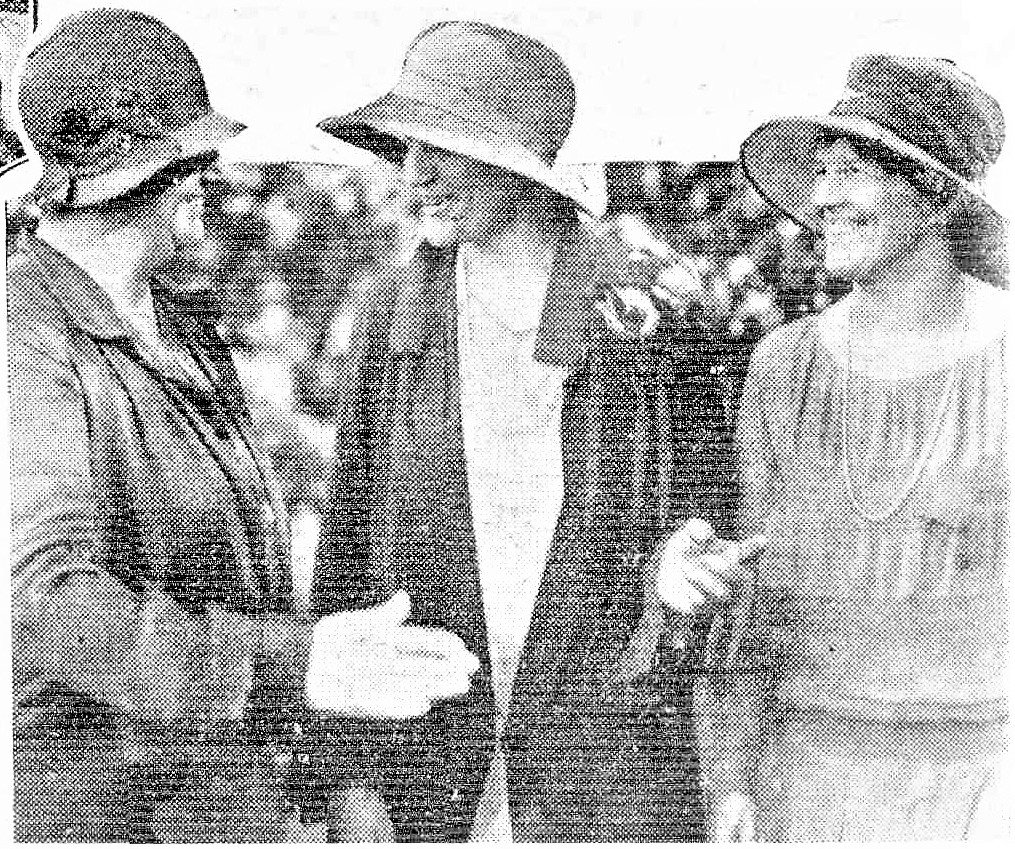
AT "TRESCO," Elizabeth Bay, committee meeting of Anzac Fellowship of Women, yesterday. — Mrs. Alec. Copeland, Mrs. Jessica Lee, Mrs. J. B. Stevenson. MONGOOSE AND COBRA LOCKED IN EMBRACE OF DEATH (1930, February 7). Daily Pictorial (Sydney, NSW : 1930 - 1931), p. 24. Retrieved from http://nla.gov.au/nla.news-article246112100
There’s a lot else of course – and a great many ‘feminists’ and WWI workers, Red Cross and other works among the founding members in the years prior to May and June 1923 – and also among those who went to look at Bilgola/Newport ridge as a possible first site for a seaside home – that and was later sold (Crown Land).
The first seaside home was 'Keera' at Dee Why, named after Keera Station, Bingara, the family home of Grace (nee Gordon) Munro's husband's family home, was available for women and children from mid January 1924 although not officially opened until July of that year.
Some insights from the newspapers and journals of then:
COUNTRY WOMEN
SEASIDE CAMP SUGGESTED
So that the country women who toil further inland may have a holiday by the sea there is a proposal afoot to establish for them a camp between Newport Beach and Dalley's cottage, which belonged to the late Colonel Watt.
Mr. Wearne, Minister for Lands, visited the proposed site yesterday, accompanied by Dr. Arthur, M.L.A., and members of the Country Women's Association. The Crown owns 65 acres of land in the vicinity, and it is thought that the Minister will be willing to grant so much as is requisite to the scheme, at a nominal rental. There is some, questioning as to whether or not it is too far from the city, however. The Minister expressed himself as cordial towards the project. It has been arranged that members of the association shall interview him further on the subject at 2 p.m. on Wednesday. COUNTRY WOMEN (1923, September 24). The Daily Telegraph (Sydney, NSW : 1883 - 1930), p. 4. Retrieved from http://nla.gov.au/nla.news-article246070345
WOMEN'S COLUMN.
SEASIDE CAMP.
On Sunday several members of the Country Women's Association, including Dame Alice Chisholm, Mesdames Hazlett, H. C. McIntyre, Kierie, Tindal, Arding Thomas, Osborne, E. Nyland, Fraser-Clark, Nest, Carpenter, Weaver, Chapman, Henderson, and Miss Warby Lugsdon, and many others representing the Cumberland branch, and the Manly and Mosman sub-branches of the association, paid a visit to the proposed site of the first seaside camp. Mr. W. B. Wearne, M.L.A. (Minister for Lands), also accompanied the party, as the area proposed belongs to the Crown. It is at Bilgola Bay, just north of Newport, and is one of the most beautiful situations Imaginable.
Mr. Wearne made the very generous offer of an area of about 30 acres, including the beach frontage, to the association. It was considered by some members that the site was too far from Sydney, but in view of the impossibility of getting a sufficient area nearer town, and the ideal character of the site, which would be reserved for all time for the benefit of the people out back, there was a general feeling that Mr. Wearne, offer should be accepted at once.
The Minister Invited the ladies present to attend at the Lands Department on Wednesday, at 2 p.m., when he would be in a position to Inform them if there were any other areas of Crown lands on the coast near Sydney which would be suitable for camp purposes. WOMEN'S COLUMN. SEASIDE CAMP. (1923, September 26). The Sydney Morning Herald (NSW : 1842 - 1954), p. 9. Retrieved from http://nla.gov.au/nla.news-article16095915
GETTING A SITE FOR THE SEASIDE HOMES
On the assumption that the better the day the better the deed, Dame Alice Chisholm accompanied by representatives of the central executive of the Country Women's Association, and by a fine representative from her own branch and the sub-branches of Manly and Mosman, went down to Bilgoola to inspect the site for the suggested seaside home.
There they were met by Mr. Wearne, Mr. and Mrs. Weaver, Dr. Richard Arthur and other representative people, and the idea was thoroughly gone into. The general impression seems to have been that the site, while in itself most lovely, was too difficult of access to serve the purpose, and so after a picnic lunch and a gipsy tea the company returned to town, having heard Mr. Weaver upon the subject, and having accepted an invitation from that gentleman to meet him at the Lands Office on Wednesday afternoon, at 2 p.m., when he would place before them all particulars of land available at Narrabeen, Collaroy, Manly and Maroubra. The ladies and gentlemen present express themselves as most grateful for the helpfulness, courtesy and keen personal interest evinced by the Minister. WOMEN IN THE COUNTRY AND THE CITY (1923, September 28). The Sydney Stock and Station Journal (NSW : 1896 - 1924), p. 1 (STOCK & STATION JOURNAL Magazine Section). Retrieved from http://nla.gov.au/nla.news-article128178558
COUNTRY WOMEN'S ASSOCIATION SECURES CROWN LAND FOR HOLIDAY HOMES
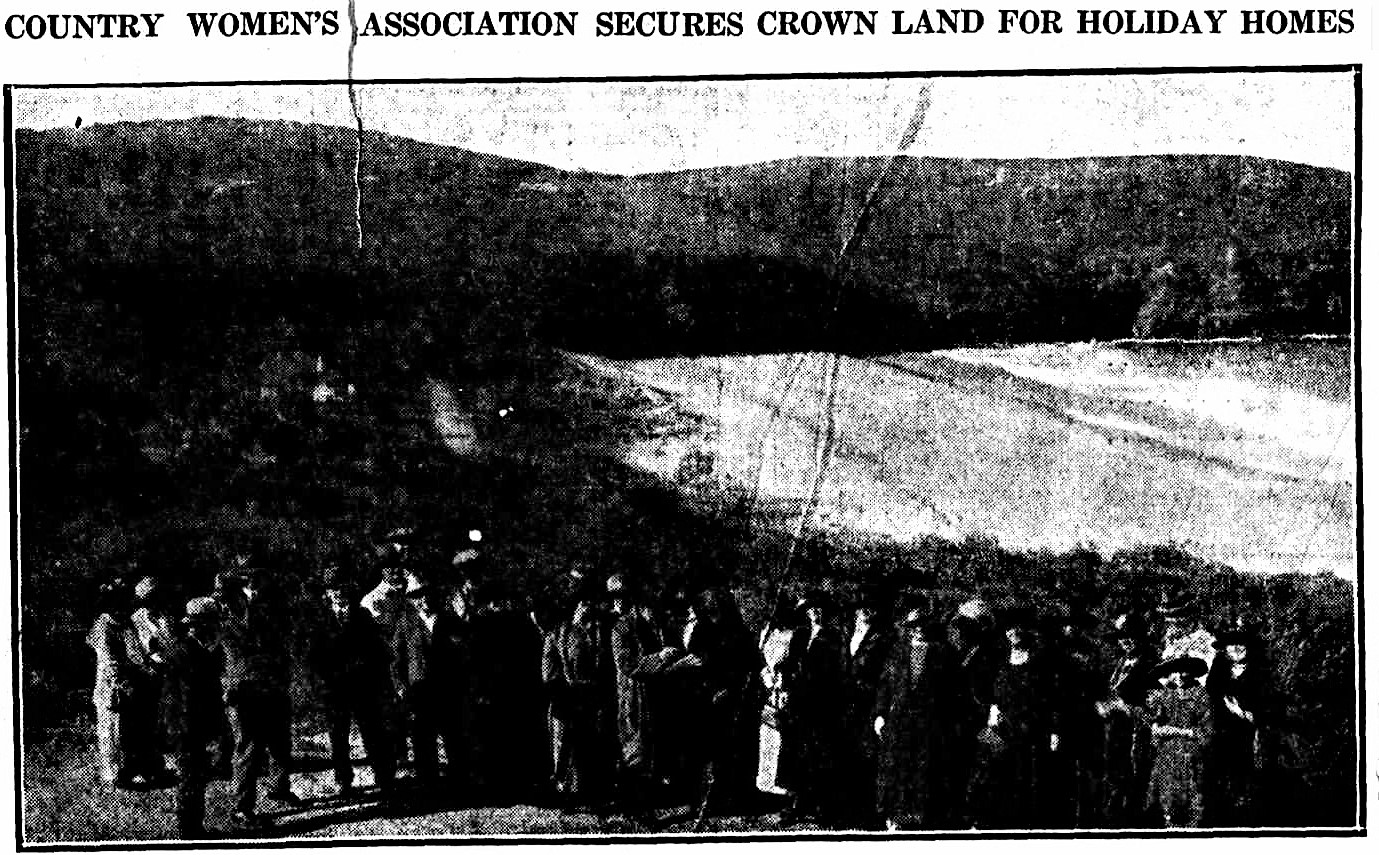
One of the most practical movements yet undertaken with the object of brightening the lives of the poor of the outback stands to the credit of the Country Women's Association. This is a scheme to erect cosy cottages on Government grand land so that every year they may be occupied for a few weeks by country families free of rent. A deputation, introduced by Mrs. H. C. Mclntyre, treasurer of the Association, and Dr. Arthur, waited on the Minister for Lands, Mr. Wearne, on Wednesday, made representations to him, and fully outlined the proposals.
The Minister granted three acres of Crown land at Griffiths Park, near Palm Beach, and the Association Intends to erect about six little homes on the ground, hoping in the meantime for aid from patriotic and humanely-principled men and women in the swelling of the funds for so laudable an object. A start will be made in the work of clearing the ground within a few weeks. The Voluntary Workers will assist.
The Association intends to establish similar holiday settlements at various resorts such as Coff's Harbor. It is endeavoring also to secure the grant of an additional 60 acres at Newport, nearby the residence of the late Lieut.-Colonel Oswald Watt. On this site, it, it proposed to erect homes to accommodate 60 families.
Representations are also to be made to the Railway Commissioners for a reduction in fares from the country to the several resorts. Lady Edgeworth David has suggested to the Association that the homes should be named in memory of the pioneer women of the outback — women who have done equally as much for the country as the men. The suggestion will be adopted. COUNTRY WOMEN'S ASSOCIATION SECURES CROWN LAND FOR HOLIDAY HOMES (1923, September 30). Sunday Times (Sydney, NSW : 1895 - 1930), p. 1. Retrieved from http://nla.gov.au/nla.news-article120536628
And then:
Women in Country and City
(Conducted by Mrs. E. M. ' Irvine!)
Home Purchased DEE WHY CHOSEN AS SITE.
'Yes, the purchase of our first Seaside Home was arranged yesterday, said the Organising Secretary of the Country Women's Association on Thursday. 'The special committee appointed last week strongly recommended Killarney, situated at the corner of Oakes-avenue and Avon-road, Dee Why, to the Central Executive, and the majority of that body, after careful consideration and inquiries, approved of the recommendation, and the deposit was paid to the agent this morning.
The property is a most suitable one. Upon the land, which is 160ft x 120ft., stands a substantial house of brick on stone foundation, and there is sufficient land as well for the erection of several of the little cottages, not unlike those at Furlough House, which will, when complete, give special privacy and comfort to the guests. The price paid is £2160 cash, and the financing of this has been made possible by the gifts of many good friends, and the loan by both members and friends of funds, either free of interest or at a purely nominal figure. The remainder of the money will be raised by special efforts, such as the Ball next week and other special entertainments.
TREASURER'S APPEAL.
The most important business before the Central Executive, when it met on the 24th of October at the Women’s Service Club, was the question of the 'Seaside Home, and, after careful discussion,, it was decided to elect a committee' and give it the work of 'carrying out the Association's scheme. With, this in view, Mesdames Ashton, Fletcher, McIntyre, and Hazlett were elected from the Central Executive, Dams Alice Chisholm and Miss Warby from Cumberland Branch, Mesdames Tindale and Moore Sims, from Manly, Mrs, Arding Thomas and Miss Rankin from Mosman; all these ten women have chosen Dame Alice Chisholm as their chairwoman, with Mrs. Arding Thomas, and Mrs. Tindale as vice-chairwomen, Miss Rankin, hon. secretary, Mrs. Hazlett Hon. treasurer, and on this rests the responsibility of organising and managing the first Seaside Home for the Country Women's Association at Dee Why which the Central Directive have this day bought for you.
The venture is the biggest thing the Association has attempted, and we now look to you to help us through. The cottage and land are worth more than we have given for them. The building is up-to-date, and in a modest way, very suitable, and is a good asset, as houses and land at Dee Why are on the upgrades in value. Dee Why being a beautiful and popular seaside resort, and although we can only take three women and their, children at a time, we have kept faith with you to the1 utmost of 'our ability, and, when I am at liberty to do so, you will have the names of the men and' women who made it possible for the Central Executive to, keep this faith with you. '
ALL SHOULD HELP.
There are many branches that have not had an effort to raise funds for the Seaside Home, and there are some branches whose memories the Seaside Homes seen to be always, and now, to you all, I make a moat earnest appeal, as far as your ability can go, to help us, as we need furniture, house linen, and food. Croydon Branch has sent several donations, and nine lovely pillow-cases; Mullaley, the considerable sum ,of £58 ; Collarenebri, £25 18s 7d ; Angledool, £20; and other branches; Dinoga, Erudgere, Moree and Dubbo, donations for which we are most grateful. Central Executive suggest to you that you have a special effort as soon as possible, such as a gift afternoon, a street stall, a tennis tournament, a dance, if not too late in the season, a linen tea or any other function. This Seaside Home is your own and we look to you to help us make it a great success and the monument to the Association that it should be, and as soon as it is ready for occupation, we shall look to you to nominate the women we are to accommodate. Women In Country And City (1923, November 13). The Sydney Stock and Station Journal (NSW : 1896 - 1924), p. 2. Retrieved from http://nla.gov.au/nla.news-article128173541
Dame Alice Isabel Chisholm DBE (née Morphy; 3 July 1856 – 30 May 1954), known familiarly as "Mother Chisholm", was an Australian woman who provided canteen services for soldiers in Egypt and Palestine during World War I.
Born at Reevesdale near Goulburn, New South Wales to Major Richard John Morphy, pastoralist of Grena Mummell, Goulburn, and his wife Mary Emma (née Styles), Alice was raised by maternal grandparents, after her mother died of measles, because her father was away serving in the Indian Army. She was educated at home. In 1877, she married pastoralist William Alexander Chisholm, a widower (died 1902); the couple had five children (three sons and two daughters); two of whom predeceased their mother.
During the First World War her son Bertram was wounded at Gallipoli. She travelled to Egypt to be closer to him; when she arrived she noticed the lack of facilities for the troops and established a canteen in the Cairo suburb of Heliopolis largely at her own expense.
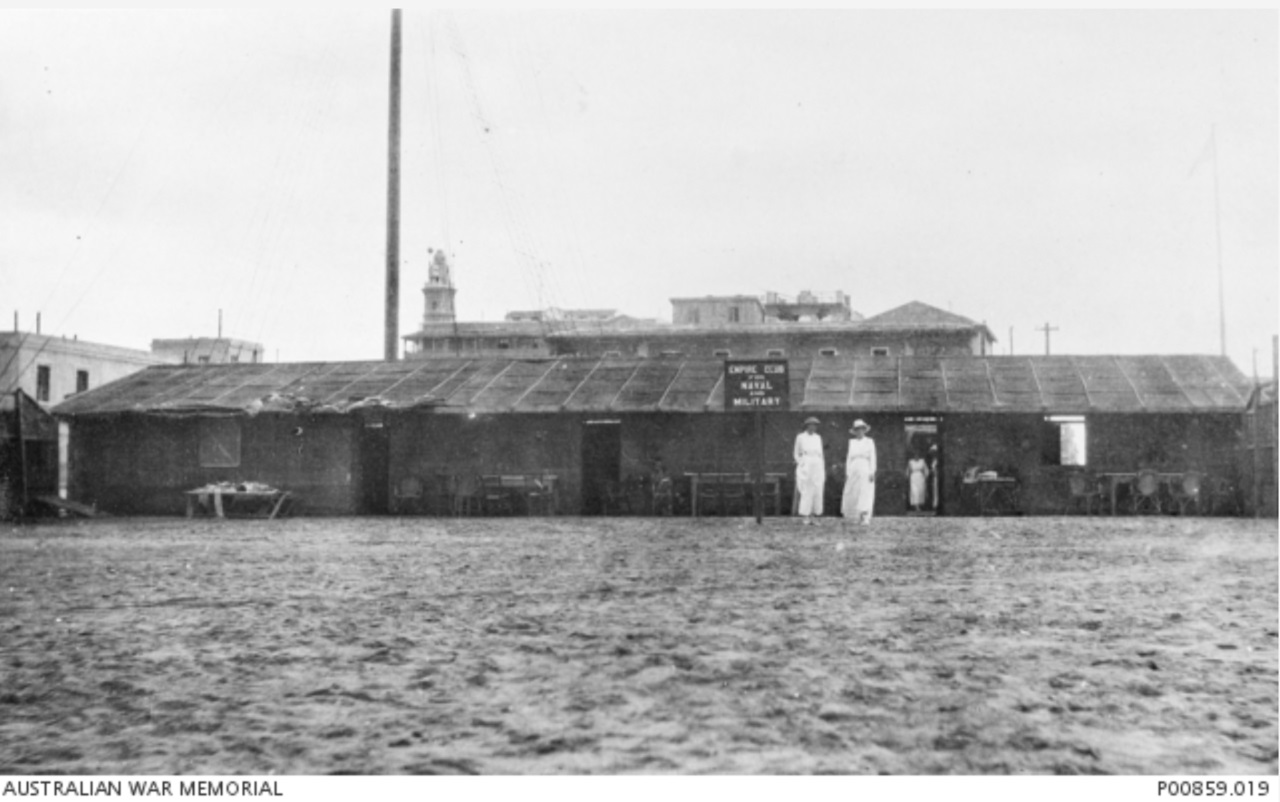
Alice Chisholm (left) and daughter outside Kantara Canteen for Naval and Military in Egypt, c.1916. Image courtesy AWM
Alica opened a second canteen in Egypt at Port Said, and a third in Kantara for troops fighting near the Suez Canal with two other Australasian women. The Kantara canteen expanded to include dormitories and dining-rooms and eventually had the capacity for handling thousands of men. Profits from the canteens were used to provide the troops with comforts for their journey home.
She was appointed Commander of the Order of the British Empire (CBE) in 1918 and Dame Commander of the Order of the British Empire (DBE) in the 1920 civilian war honours. When she returned to Australia she continued working within the community. She helped found the Returned and Services League of Australia in Goulburn and she was active in the Country Women's Association and RSPCA.
Dame Alice passed away at her home at West Pennant Hills on May 30th 1954, aged 97 years 11 months, and was buried in the Church of England cemetery at Kippilaw, near Goulburn.
The Seaside Home had its first intake that Summer:
OUR GROWING ASSOCIATION.
The Country Women have now 61 branches spread all over the State. The. year just closed has brought forth the remarkable fact that it is possible for three thousand women to bind themselves together in the small space of 21 months, and work harmoniously (despite the general bad character given them, by men, for quarrelling) I for the good of their fellow-women, j without a. single ruffle upon the waters of the Association stream. Money has been collected, great undertakings brought off— like the opening of Keera House and the cottage at Corrimal— big balls engineered, and still there is no rift, within the lute. Could there be any more convincing evidence of the great need that existed for the Association, and its practical ideals.
Rules and Tariff for Keera House, the Seaside Holiday Home of the Country Women's Association at Dee Why.
The tariff shall be: — £1 per week for adults over 16 years ; 10/- per week for children from 10 to 16 years; 5/per week for children from 3 to 10 years. Children under 3 years free. Payable in advance to the Matron.
RULES.
1. Visitors to keep their rooms clean and tidy, and to make their beds. 2. No visitors or children allowed in pantry or kitchen, except by special permission. 3. Laundry to be used only by permission, and to be kept perfectly clean. 4. Visitors, particularly children, are not to come into the house in their wet bathing suits, but to take them off in the room provided for the purpose. 5. Only one colored towel to be taken to the beach. 6. Visitors to be responsible for their breakages. 7. Each mother to be responsible for the safety of her children while she is in residence at the Home. 8. House linen will be handed out by the Matron, and must be signed for by the mother of the family in a book to be kept for the purpose. The same number of articles must be handed back in good condition before the family leaves. 9. Visitors only on one afternoon a week to inmates. Breakfast 8 a.m. Dinner 12 noon Afternoon Tea 3.30 p.m. Tea 6 p.m. Applicants to be received into the Home should be addressed to the Hon. Secretary, 17 Castlereagh St., Sydney, or to the nearest Branch Secretary. Applicants may stay three weeks. For Women in the Country & City in NSW (1924, January 18). The Sydney Stock and Station Journal (NSW : 1896 - 1924), p. 5. Retrieved from http://nla.gov.au/nla.news-article128177685
Growth of a Great Ideal - The Country Women's Movement
Ideals are not too plentiful m the World to-day, and it is therefore a pleasure to contemplate the growth of one within the boundaries of our own State which, for practical helpfulness, it would be difficult to surpass.
THEN, about a year and eight months ago there was a report in the daily papers, the report of a conference of country women, many people were fairly amused and not a few frankly sceptical The ideals voiced by the ladies were far too much in the air — so said the wiseacres — and the whole thing annealed to a good many people altogether too altruistic to be within the sphere of practical politics.
They were wrong. What the conference voiced somewhat, vaguely, the committee subsequently appointed quickly brought down to the concrete, and the outcome of their deliberations was a few simple aims, which, without further talking, they set themselves to carry out.
First of all, the idea was broadcast throughout the Slate; the organisers invited country women lo become members and to establish branches: and as the fee had wisely been fixed a t the moderate sum of 4s annually, the membership grew rapidly, and the number of branches to dually increased.
At first, of course, many of the country people knew very little about the mailer, and, as is invariably the way, they regarded it with some suspicion. But it was the practical nature of the association’s efforts that Interested and caught iheiJ1 attention. The papers gave publicity to what the executive were doing in the way of deputations for holler travelling conditions, more hospital accommodation for women, and more nursing facilities. The women of the country read of these things, and they seemed to them good.
FOR years there has been sporadic agitation for more nursing in the bush, improved accommodation for maternity cases, and more, help for children residing away from schools, and there had been an annual outcry against the scale of railway charges to and from the more remote portions of the State, to the seaside or mountains. With the establishment of the association this agitation took on an entirely different atmosphere. Hitherto it had been merely a complaint, but with upwards of 2000 feminine voters banded together — non-politically certainly, but with a vote — the complaint partook immediately of a demand, with which it was' necessary to listen with attention. The reforms asked for were not such as demanded any undue expenditure from a Government already at its wits' end to meet its liabilities. The requests wore for easily-arranged mailers, such as heller accommodation on railways and at refreshment rooms. They appealed, not to the Government, but to their own members to raise the necessary money to buy a Seaside Holiday Home and they got it. They said: 'If maternity beds are required in country hospitals, and if the Government cannot see its way to build a ward, then the women must produce the requisite funds.' And Bourke, to quote only one of the branches, has that money already in hand.
They did not raise the red flag- of rebellion, but the white flag of truce. They said: 'We want to help.' And one result, of this conciliatory attitude was an invitation by the Chief Secretary to confer upon such portions of his new Hospital Bill as affected the country administration of hospitals.
.jpg?timestamp=1676602867589)
DESIGN FOR SEASIDE COTTAGE. This is the design accepted by the association for its seaside cottages. It provides for four bedrooms and bathrooms, and there is a separate building with dining-room, administrative offices, etc. The architects are Messrs. Rowe and England.
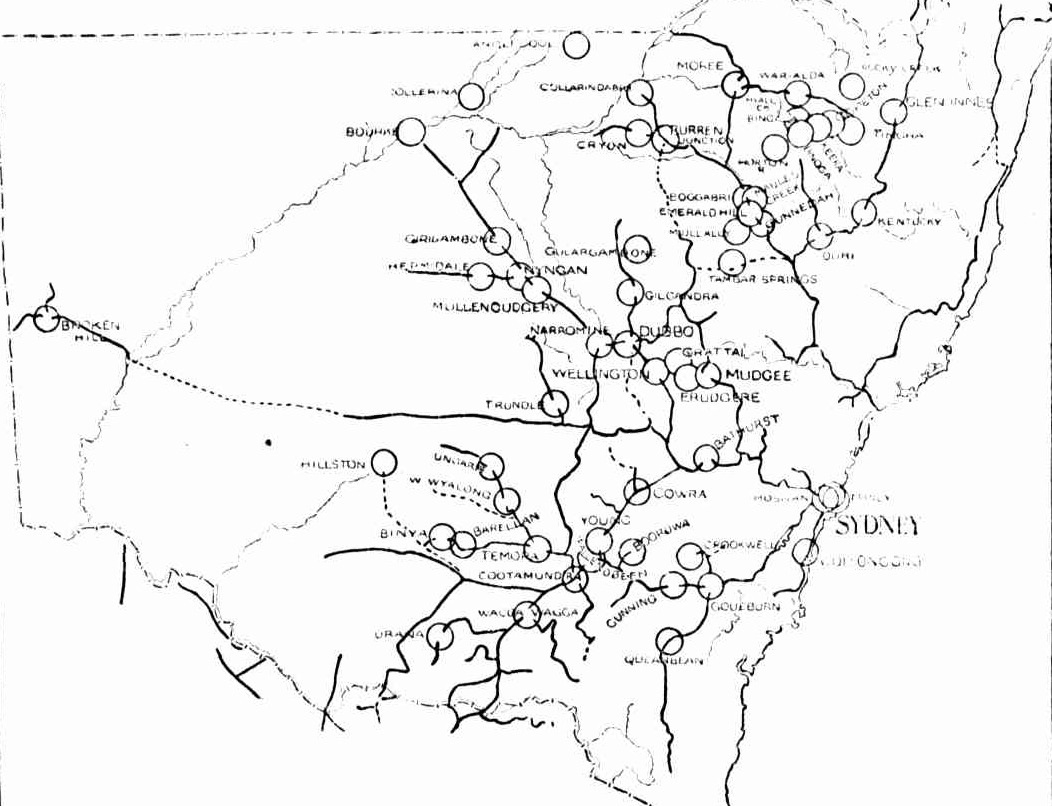
A WIDE-SPREAD ORGANISATION. Each ring represents a branch of the Country Women's Association.
Land was asked of the Government for the erection of 1he seaside homes, where women and children from the far out places might be accommodated, boarded, and well fed at a minimum of cost. Mr. Wearne immediately lent all the aid of his department, and the land placed aside at Bonnville and Port Macquarie for the association will very soon be occupied by these homes. Two are already open near Sydney — Keera House, at Dee Why (bought outright by the executive, assisted by a special committee and the metropolitan branch and its subbranches) and a cottage at Corrimal, generously lent by Major Lewis for the summer.
TO gain a fund whereby more Bush Nurses might be placed in the country Mrs. James Ashton and a committee of members and friends of the association inaugurated two polo week halls last July, and as a result the Bush Nursing Association has a further Sum of £511 this year with which to help to establish centres; and, further than this, the Glen Innes branch, and later the Gunning centre, made themselves responsible for part of the necessary money to open two more centres. It will thus be seen that the association deals in things practical. It has its seaside homes, and will extend this idea. It has brought, and will continue to bring, better and wider spread nursing aid to the mothers of the bush. It has not as yet been very successful in railway reforms, but it will use every lever in its power until these are accomplished, and it is today straining every nerve to bring skilled maternity care— free when absolutely necessary— to the women who are bringing into Australia healthy citizens in the native-born. There are also two healthy centres open owing to the association's enterprise, and others are in course of formation, and it has now a scheme whereby cheap but effective ambulance cars will be made available to isolated country centres. And all this in twenty months of its existence.
ONE prominent station-owner has said that, of all the association's activities his sympathies go out most fully to the formation of country clubs in country towns, where tired mothers driving long distances with their children find a refuge while the men are about their business. Here the country mother — and her husband, too, if he desires — may have lunch, leave parcels, and in some cases leave the children in the safe keeping of the caretaker while the association's seaside home at Dee Why, where country women are enabled to have at a very moderate cost a delightful rest: without having to bother about cooking or other house work.
.jpg?timestamp=1676602839725)
KEERA HOUSE, The association's seaside home at Dee Why
shopping is being done. Ponies are tied up and fed in the yards, and a tired baby may be hushed to sleep, bathed, or tidied up in comfort, while a mother, not feeling well, can occupy the bedroom or restroom during the heal of the day. Twenty-two of these clubs are now open, and more are being established every day. To quote the gentleman referred to above, -'they are the best things ever undertaken by women.' 'Splendid work is being done in looking after country women temporarily in town, and perhaps, after all.
The greatest blessing that it has brought has been the forming of branches, thus bringing closer together the line women of country places and welcoming them into small circles of mutual sympathy, interest, and understanding. So successful has it proved, indeed, in this respect that the head office mail frequently contains appreciative Idlers showing that great numbers of women, however far they may be from the centre of civilisation, are beginning to feel that in the association they have a friend, all-understanding and all-sympathising. And all the president (Mrs.. Hugh Munro and her devoted executive ask is that the women of NSW) will stand behind them in this far reaching and all-important work of making the lives of 1he country dweller happier, safer and more, comfortable. They ask them to join up in their thousands, because every name upon the register is another stone in the strong edifice of good-fellowship and sisterhood that they are steadily building up for the greater happiness and glory of the Mother State.— E.M.I. Growth of a Great Ideal (1924, February 13). Sydney Mail (NSW : 1912 - 1938), p. 23. Retrieved from http://nla.gov.au/nla.news-article166151668
KEERA HOUSE.
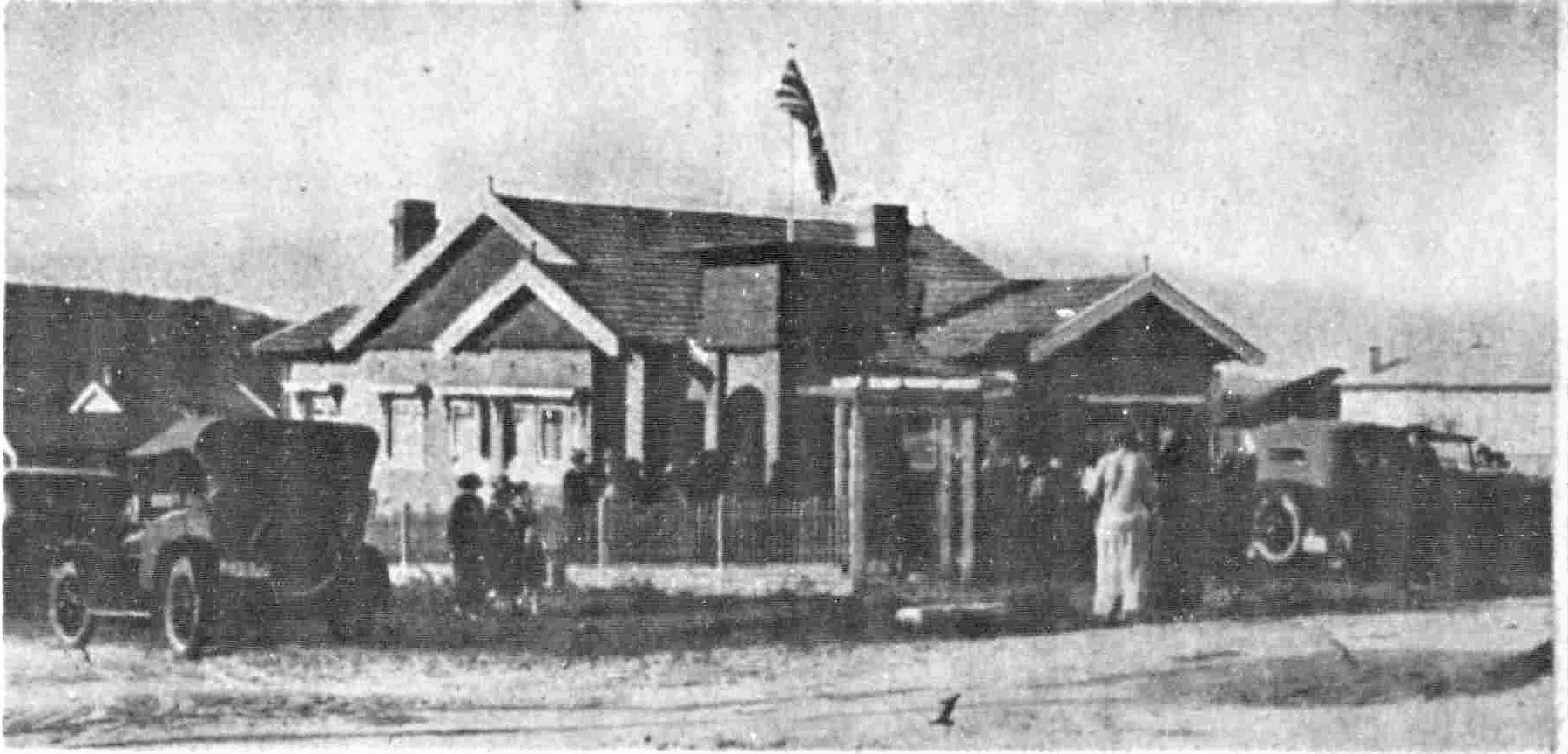
First Seaside Home of Country Women’s Association of N.S.W.), erected at Dee-Why, near Sydney. OUR COUNTRY HOMES. (1924, March 14). Farmers' Advocate (Melbourne, Vic. : 1917 - 1924), p. 13. Retrieved from http://nla.gov.au/nla.news-article223608914
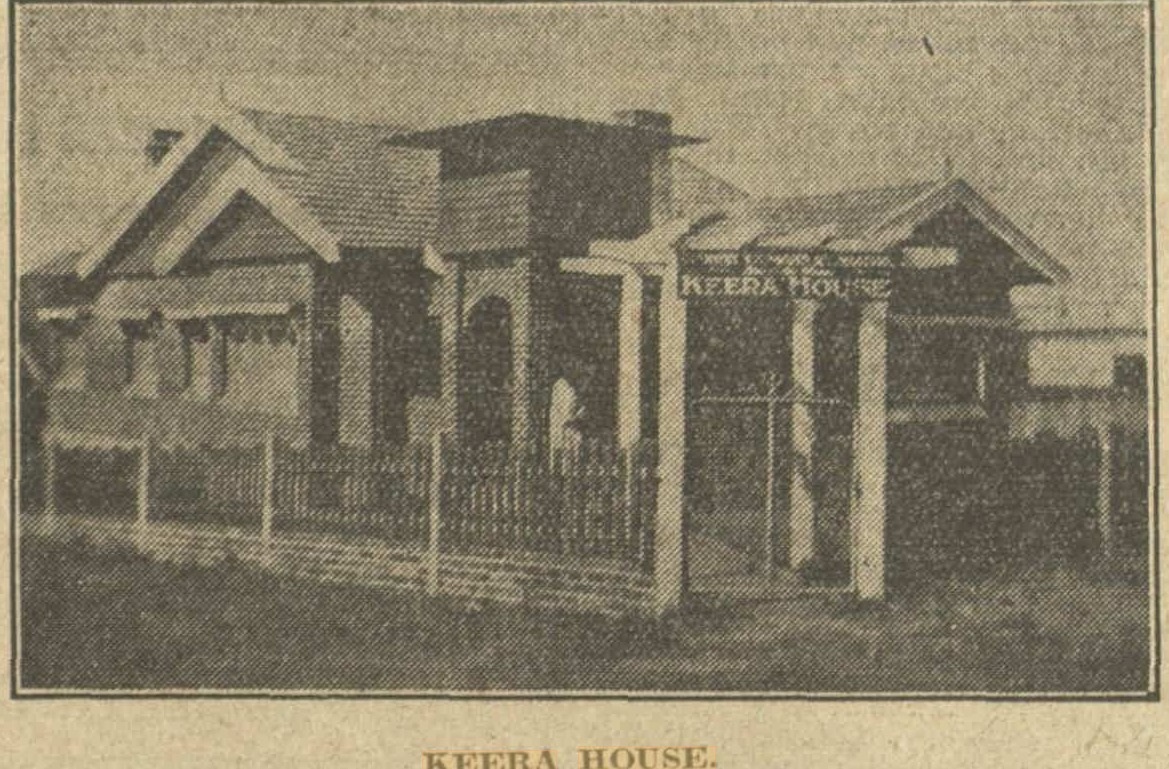
A wing was added in 1926 and the grounds expanded - a 1937 description provides:
KEERA HOUSE.
HOSTEL FOR COUNTRY WOMEN AT DEE WHY.
Keera House, the C.W.A. Hostel for country women and children at Dee Why, was named after the station home of Mrs. Hugh Munro, of Bingara, whose name is inseparably connected with that of the Country Women's Association.
Keera House is within a short distance of the beach and stands in extensive grounds. There are several buildings to accommodate the women and children who come from all over the State to partake of its hospitality, and a big dining room caters for everyone on the family group system. Each family has its own table, and as each family also has its own room, there is none of the usual boarding house or hostel atmosphere and things are made much happier and homelier for the people front the outback.
The home is under the able super vision, of Matron Booth, who has as chief assistant Miss McCrae, and both ladies are very popular with visitors owing to the friendly interest and concern for the happiness and com fort of all at Keera House. The home has accommodation for eighty mothers and children, and at the present time it is reported that it is fully taxed, there being about fifty children and thirty mothers in residence.
For a period of three weeks tired mothers and their children can live by the seaside under ideal conditions and at rates which are remark ably low. The food is excellent and the rooms are so well equipped with all necessities that it is a real plea sure for women from the country districts to holiday there. The C.W.A. has other hostels at Bar Beach (Newcastle) and Sawtell (North Coast), and all are run on the same excellent lines as Keera House, which is becoming so increasingly popular that it will probably be only a short time before it is found necessary to extend the accommodation.
Well kept lawns and attractive gardens add to the beauty of Keera House, and country women with large families who desire an enjoyable holiday by the seaside should communicate with the secretary of the nearest C.W.A. branch and obtain full particulars. KEERA HOUSE. (1937, January 14). North West Champion (Moree, NSW : 1915 - 1954), p. 3. Retrieved from http://nla.gov.au/nla.news-article178290228
By 1927 membership had more than doubled and there were 191 branches. By 1928 it was the largest women's organisation in the state and membership continued to grow in the 1930s, despite the straitened financial times.
By 1937, there were more than 17,000 members, 345 branches and 133 Younger Sets. By 1953 there were 28000 members and 517 branches, 182 rest rooms, 157 baby health centres, holiday homes, rest homes, hospitals, school hostels and playgrounds.
Younger Sets were introduced at the 1927. Their purpose was to 'further the aims of the CWA in general and in particular to use every opportunity of being instructed in First Aid, Home Nursing and Mothercraft'-. They were to perform social service and arrange social functions. Girls joined at 18 and often remained until 30.
Although the specific activities of individual branches varied, among other endeavours, they actively supported the Bush Nursing Association, the Far West children's health Scheme, the Bush Book Club, Girl Guides, and Boy Scouts, Travellers Aid and the flying Doctor Service.
PARTY AT MANLY FOR FAR WEST CHILDREN.
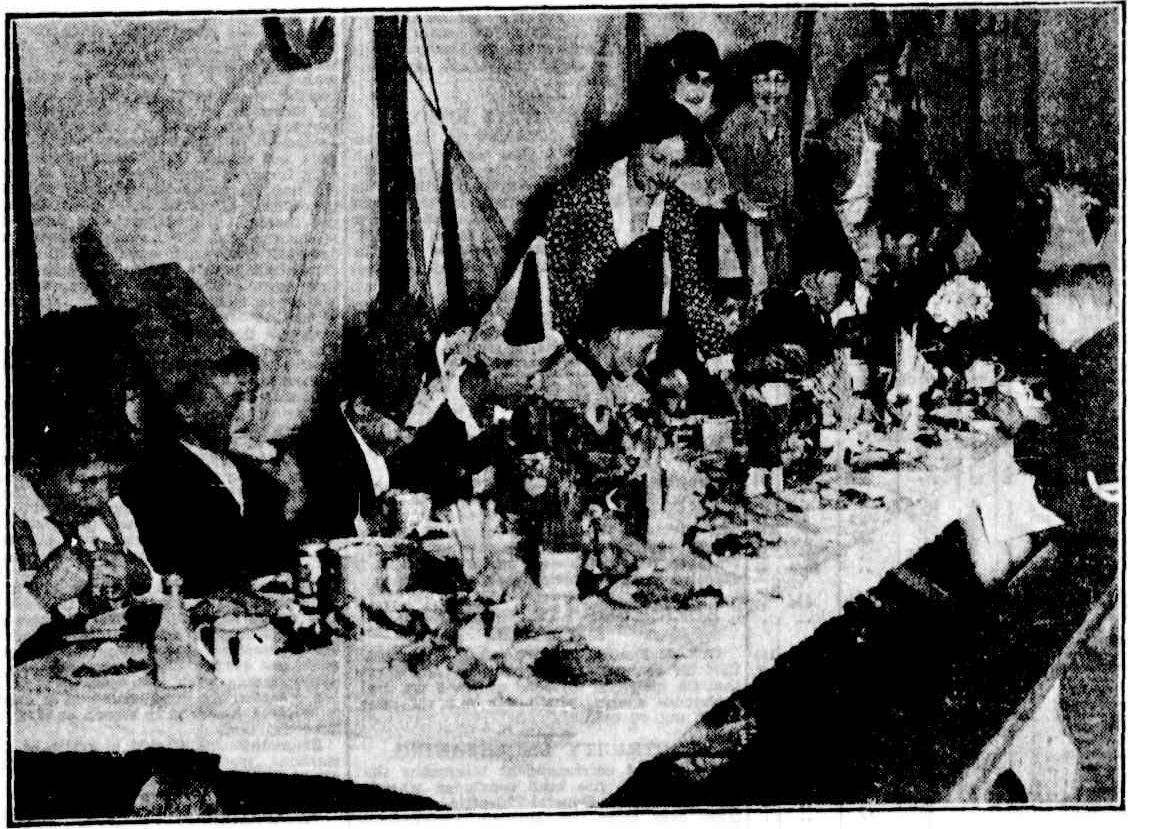
The invalid children from the country, who are attending camp at Manly, were entertained last night by the Manly branch of the Country Women's Association. PARTY AT MANLY FOR FAR WEST CHILDREN. (1931, January 20). The Sydney Morning Herald (NSW : 1842 - 1954), p. 12. Retrieved from http://nla.gov.au/nla.news-article16747140
Opening of the CWA "Violet Jennings Rest Room" - Merriwa, NSW - “In the presence of a large gathering the new CWA rest rooms were officially opened by the Shire President, Mr A M Jennings ... Mrs R. H. Dangar, member of the central executive, described the rooms as the prettiest she’d ever seen.” (Reference: Sydney Morning Herald, 6 Dec., 1930)
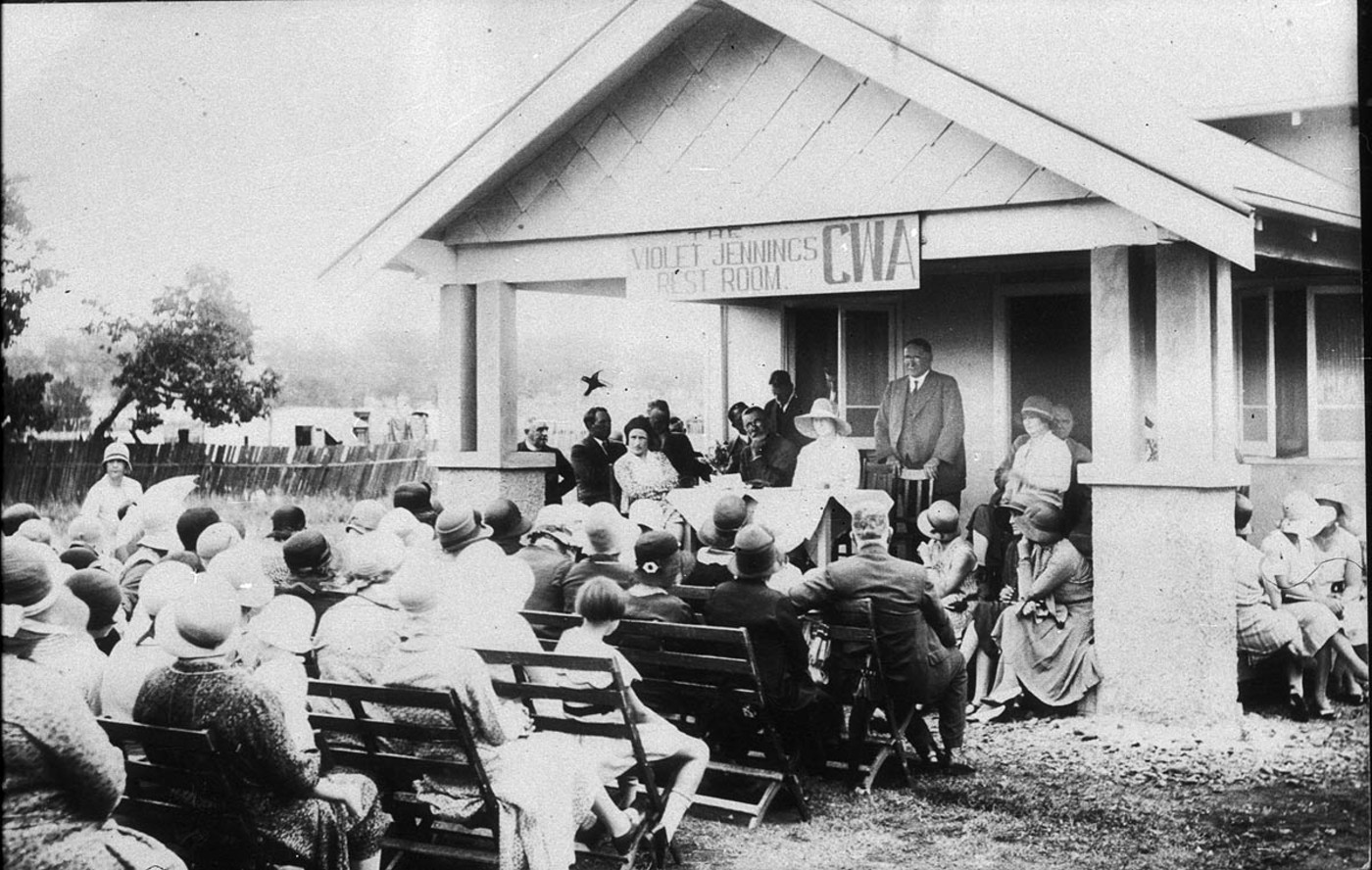
Item: bcp_06510h, courtesy and from the collections of the State Library of New South Wales.
From the 1930s handicrafts have featured among the associations activities, and they have also produced numerous cookbooks - who doesn;t have a copy of one or more editions?.
Association news was regularly reported in the Stock and Station Journal and in 1937 the CWA's own journal was established.
During WWII, most CWA efforts were redirected to supporting the war effort. They entertained and fed men in country training camps, supported the Australian Comforts Fund and knitted garments for soldiers, just as foundation members had during WWI. They particularly took on the task of making camouflage netting for the army from 1942. Over 400 camouflage netting circles were established, producing hundreds of thousands of nets by early 1944. Many members were also left to run the family farm while their husbands were away fighting and had more women coming to them as part of the Land Army of Australian women and girls who moved from the city to the country to help out and keep the nation fed.
In the post-war years the CWA took an interest in welcoming new migrants - meeting at least two ships a months and providing catering for 1000-2500 migrants a time. They also helped families settle and invited women to branch meetings. Special services were set up for migrant women living in the snowy Mountains. However, like the rest of Australia, the CWA largely ignored the plight of Aboriginal people-although they were more prominent in rural areas-until the late 1950s at least when some branches began to encourage Indigenous women to join, although prejudice among some members persisted.
Country women and children at Keera House, Dee Why (taken for "Smith's Weekly") Date: 21/3/1947, photos courtesy The Mitchell Library, State Library of NSW:
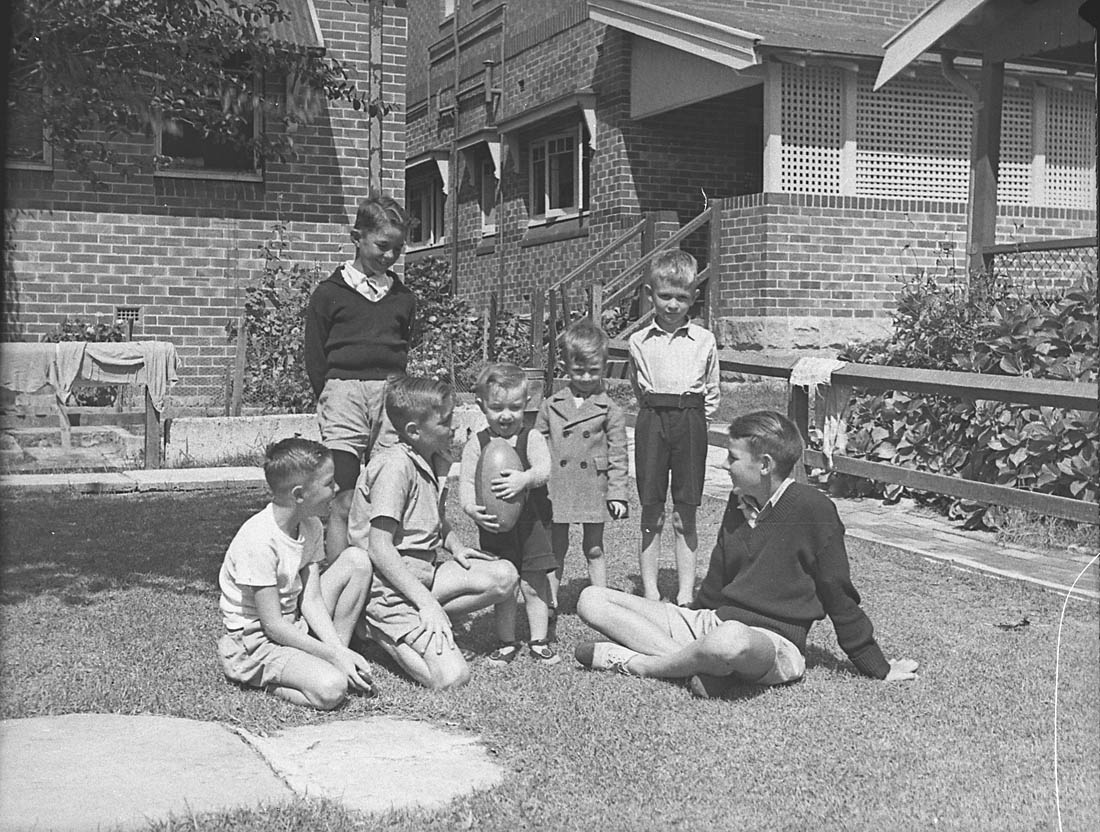
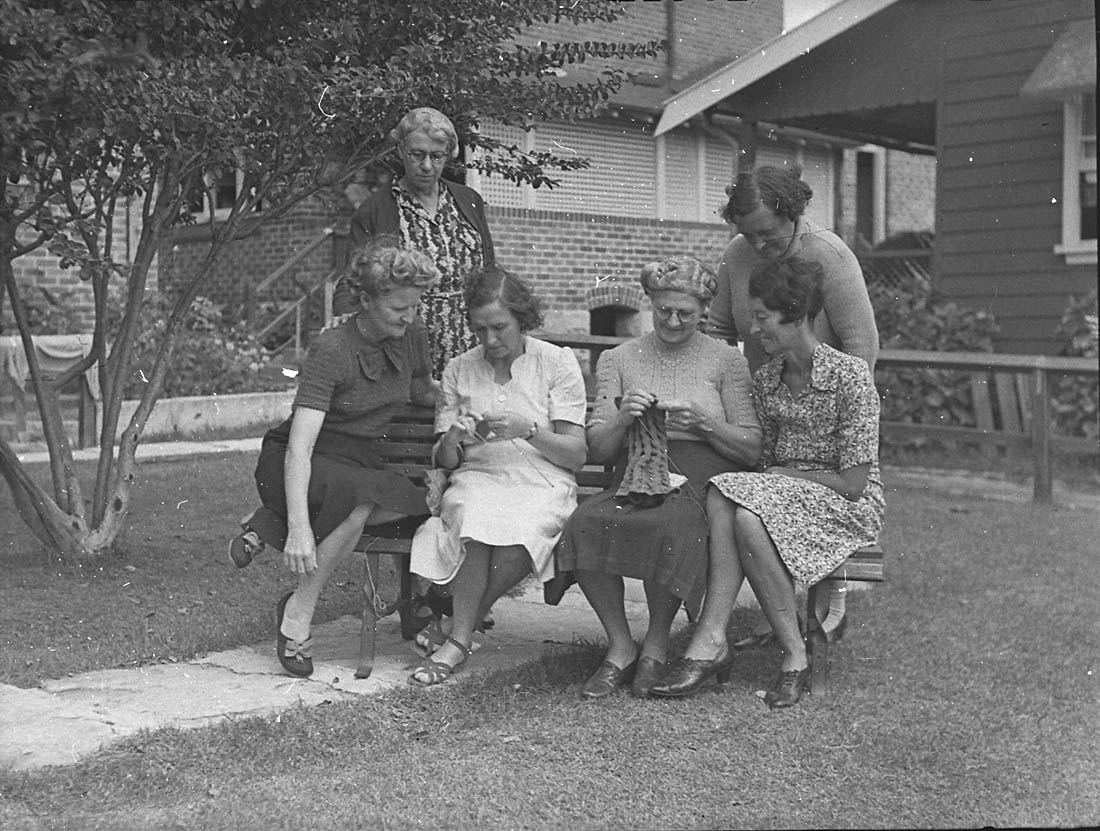
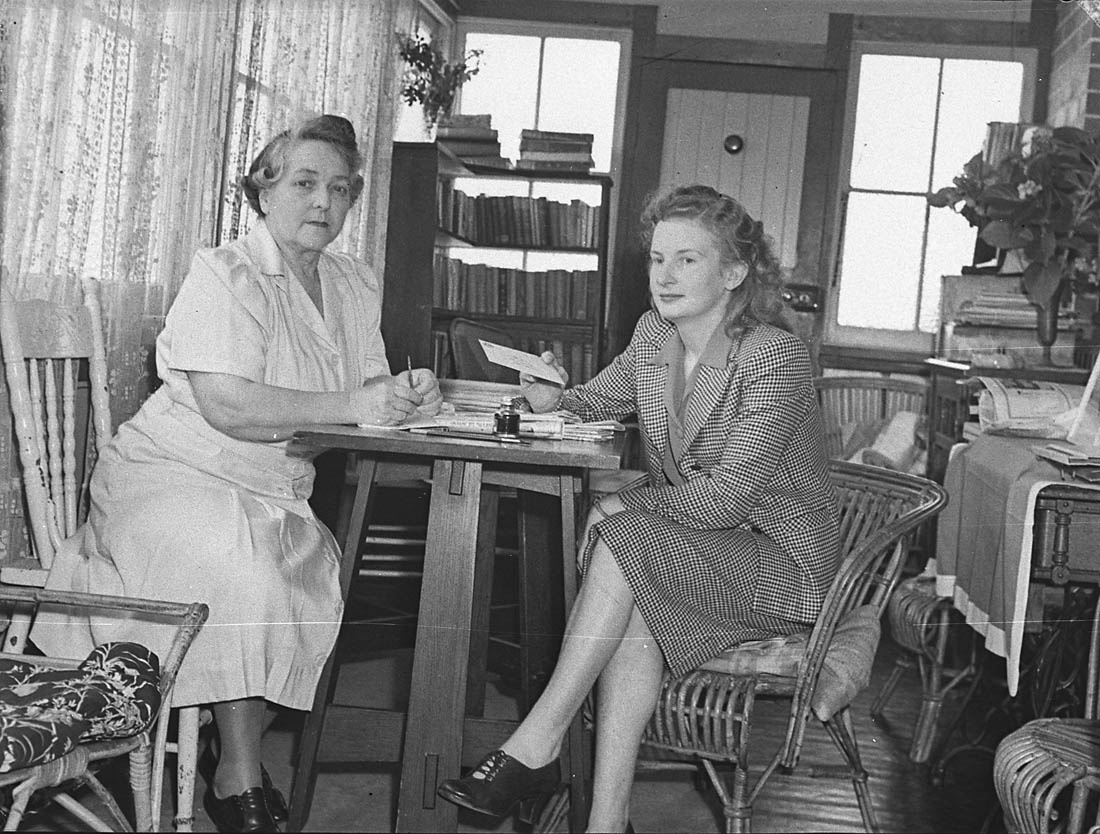
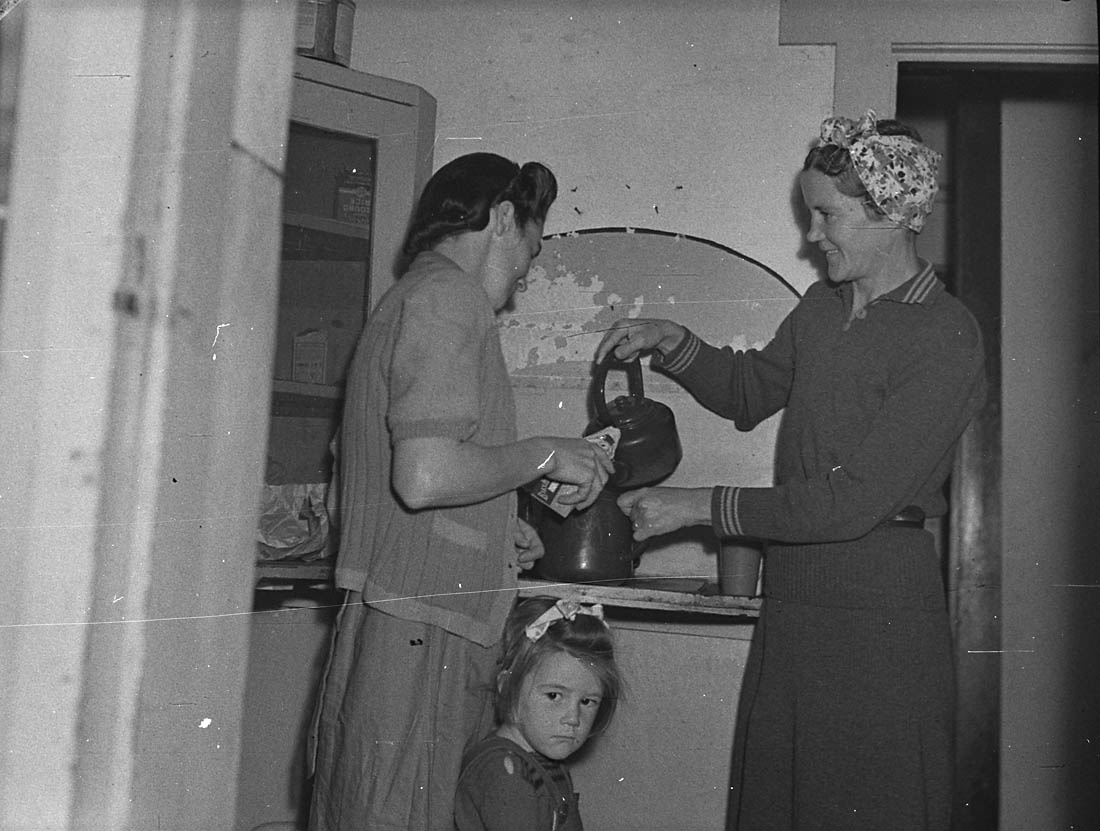
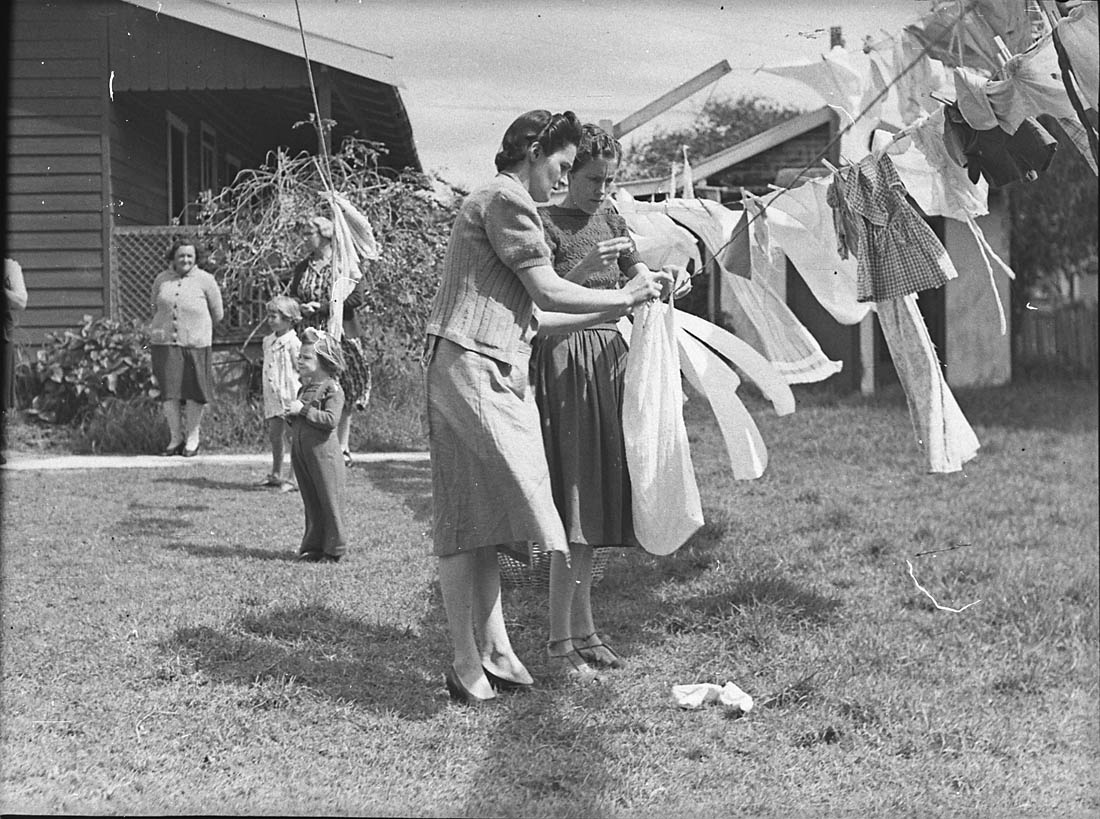
In 1955 a new 'Keera' was opened in Manly itself:
THE NEW KEERA – MANLY CWA
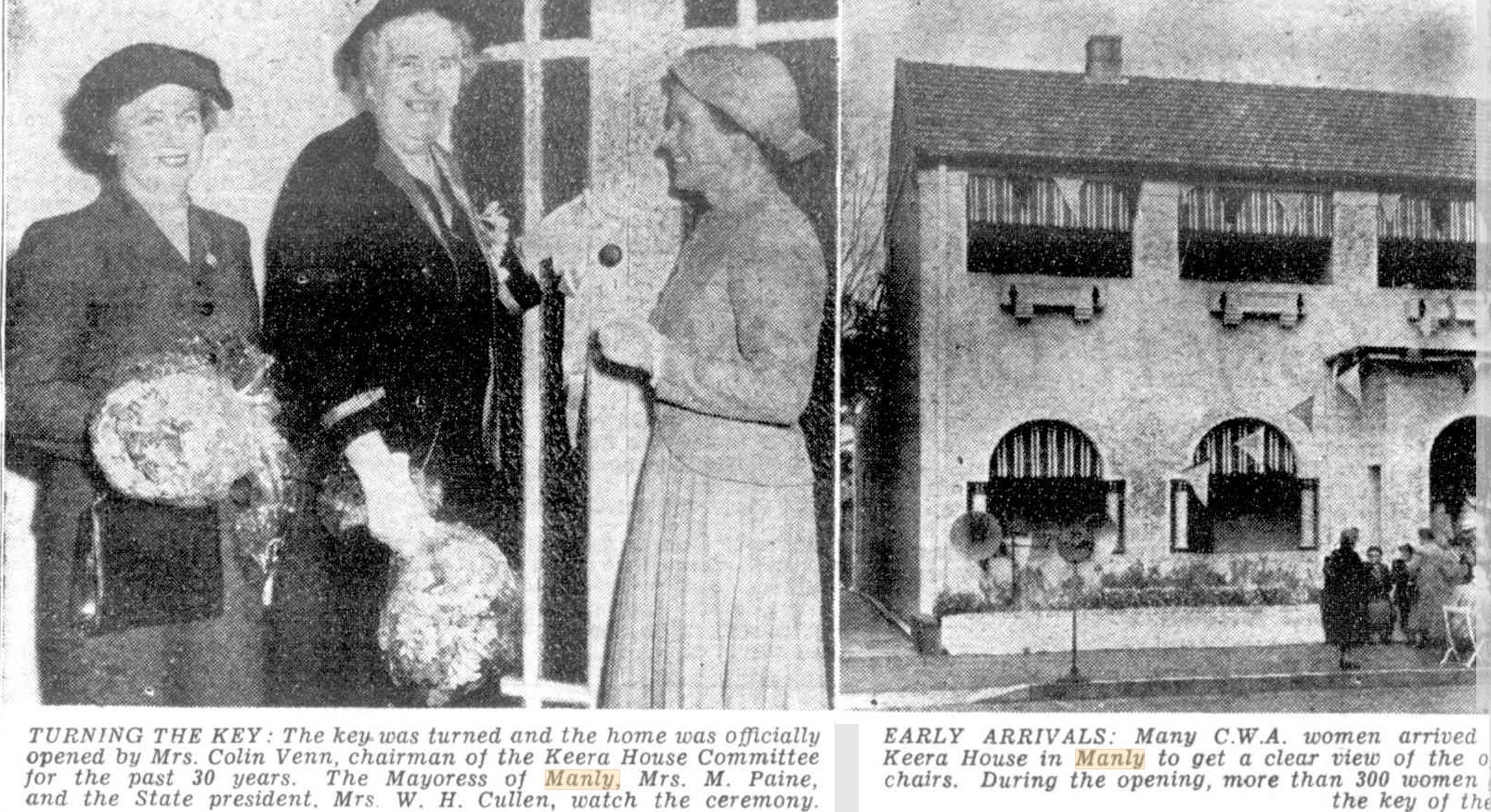
TURNING THE KEY: The key. was turned and the home was officially opened by Mrs. Colin Venn, chairman of the Keera House Committee for the vast 30 years. The Mayoress of Manly, Mrs. M. Paine, and the State president. Mrs. W. H. Cullen, watch the ceremony.
.jpg?timestamp=1623526785073)
EARLY ARRIVALS: Many C.W.A. women arrived Keera House in Manly to get a clear view of the chairs. During the opening, more than 300 women the key of the arrived well ahead of time and gathered outside the new the official opening . Some came equipped with folding chairs women grouped in this spot to watch Mrs. Colin Venn turn of the new home.
.jpg?timestamp=1623526842070)
OLD FRIENDS: Miss D. Wilson, president of the Trangie branch, greets an old friend, Mrs. S. C. Seaman, from the Hargraves branch of the Mudgee-Coolah group. Miss Nancy Foskett, Department of Agriculture, looks on with Mrs. C. H. Faggan, Tamworth, and Mrs. M. Dempsey, patron of the Mendoran branch of the Mudgee-Coolah group.
.jpg?timestamp=1623527360558)
BUYING TICKETS: Miss Madeleine Grant, C.W.A. Younger Set State leader, sells tickets to Mrs. H. C. Mclntyre, Inverell, and Mrs. Clement Chapman, wife of the honorary doctor to Keera House:
WELCOME TO MAYOR: Mrs. W. H. Cullen, State welcomes Mrs. M. Paine and Alderman Paine, the May( opening of Keera, the new C.W.A. seaside State president of the C.W.A., Mayor of Manly, to the official seaside home at Manly.
On Saturday afternoon Mrs. Colin Venn opened the new Keera House at the Sydney seaside suburb of Manly. The new Keera has been bought and converted by the Country Women's Association of N.S.W. to replace their old home at Dee Why.
On Saturday afternoon the new home was over-run by country and metropolitan members of the Association who had their first chance of inspecting it. The low, white building with its newly painted yellow and black pillars was rigged with flags for the opening and the spacious halls and afternoon tea rooms were filled with flowers. The home has comfortable accommodation for 86, with lounges and a spacious, airy dining room. One family moved in after the ceremony on Saturday and three more the next day. The Association has even had one enquiry from a member at Alice Springs who wants to bring her family to Sydney for the school holidays. Unlike the old Keera; husbands will be allowed to stay, too.
.jpg?timestamp=1623527410793)
C.W.A. past vice-president and second State president, Mrs. A. J. Studdy (centre), with Mrs. W. A. Henderson, Manly branch, and Mrs. R. V. Hole, Coonamble.
.jpg?timestamp=1623527454322)
ENGLISH VISITOR: Newly arrived from the Women's Institute of England is Mrs. H. F. Gray, who is seen here discussing the new Keera House with the general secretary of C.W.A., Miss Margaret McCallum.
.jpg?timestamp=1623527488689)
DINING ROOM: A corner view of the attractive dining room with its seating room for 86 guests. After the official opening, afternoon tea was served in this room for the official party and later for guests. THE NEW KEERA (1955, May 13). The Farmer and Settler (Sydney, NSW : 1906 - 1955), p. 24. Retrieved, from http://nla.gov.au/nla.news-article117409652
The CWA was, and continues to be, a generally conservative organisation with an almost exclusively white membership. In the early days at least, many of the most active members were women with money, education and leisure. Historically, it was, however, also a progressive force in many ways. As early as 1936, for example, the NSW branch passed a resolution in favour of equal pay for women. Although the organisation has in many ways defended traditional gender roles, it has advocated a greater public role for country women. It has also been outspoken on environmental issues.
Helen Townsend provides an excellent overview of the diverse nature and activities of the group:
'The Australian countryside has always been seen very much as the province of the Australian male. Folklore and literature concentrate on the tradition of mateship, the struggle of man against nature … The Country Women's Association has tended to be ridiculed, partly because it is a women's organisation operating in a male domain, and partly because the women who belong to it are such a far cry from the stereotype of the "little woman." The women of the CWA, while believing deeply that their role in the family is vitally important, have been initiators, fighters and lobbyists. They have made localities into communities by providing social activities and educational, recreational and medical facilities …
She further notes that the group is both practical and idealistic, radical and conservative: 'They are radicals, insisting on better community facilities, yet the conservative guardians of traditional values.' [Serving the Country, p. vii.]
From the late 1960s the numerical strength and influence of the CWA began to decline. It has since revived somewhat.
In 2004 its stated aims were:
(a) To bring all women and families together and form a network of support.
(b) To provide a forum for the voice of all women in New South Wales.
(c) To improve conditions and welfare of all women and families especially in country areas.
(d) To support schemes which enhance the value of country living, especially health and educational facilities.
(e) To encourage development in regional areas and to increase the viability of rural communities and the environment.
(f) To provide a voice to Government at all levels.
(g) To promote International goodwill friendship understanding and tolerance between all people.
In this year the Association has over 13,000 members, belonging to one of 500 local branches.
Thank you to Manly CWA member Diana Whitton for reaching out to HQ and sourcing some very special pieces of information from when our local branch was first created, along with an overview of CWA Manly's activities since then from those yearly minutes:
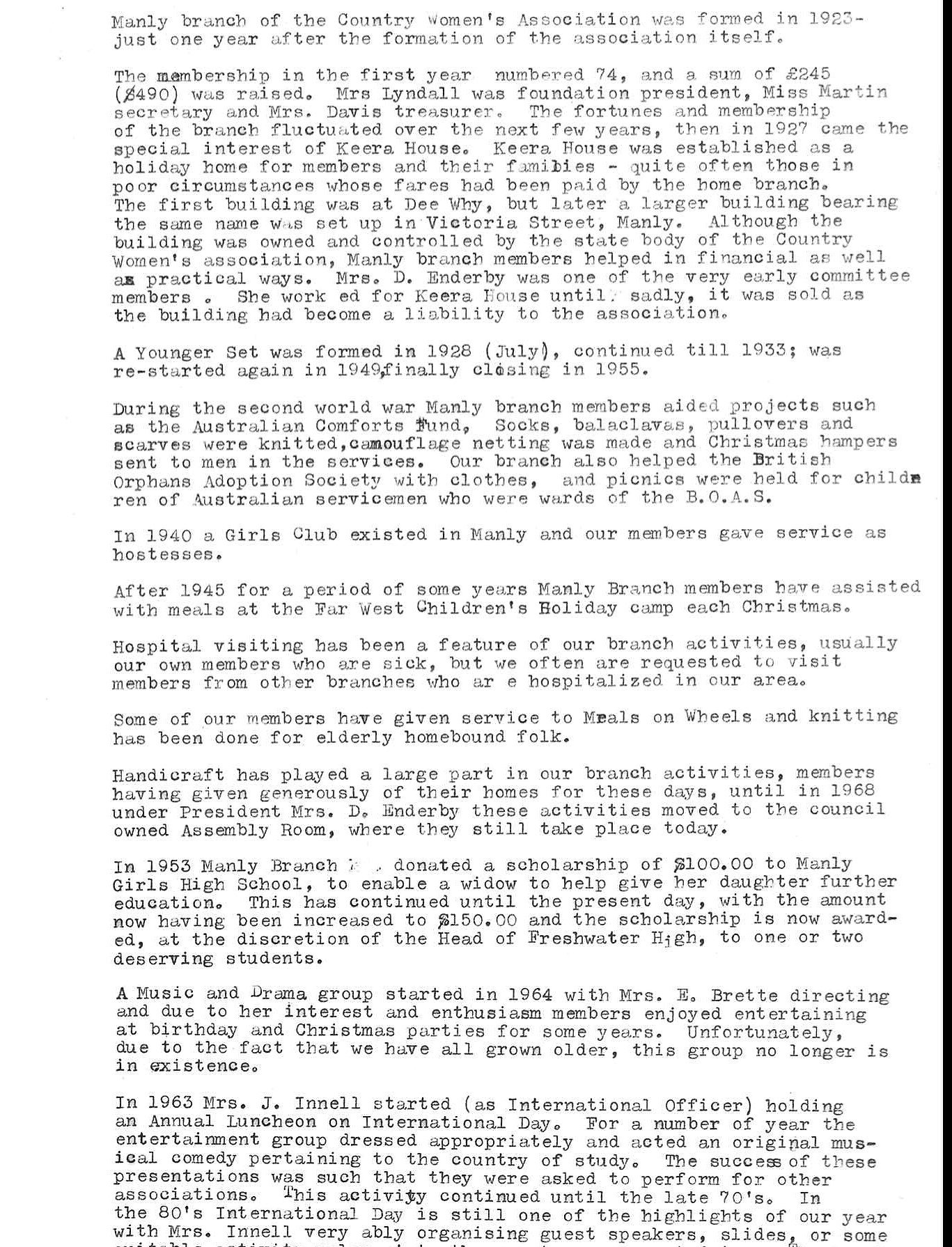
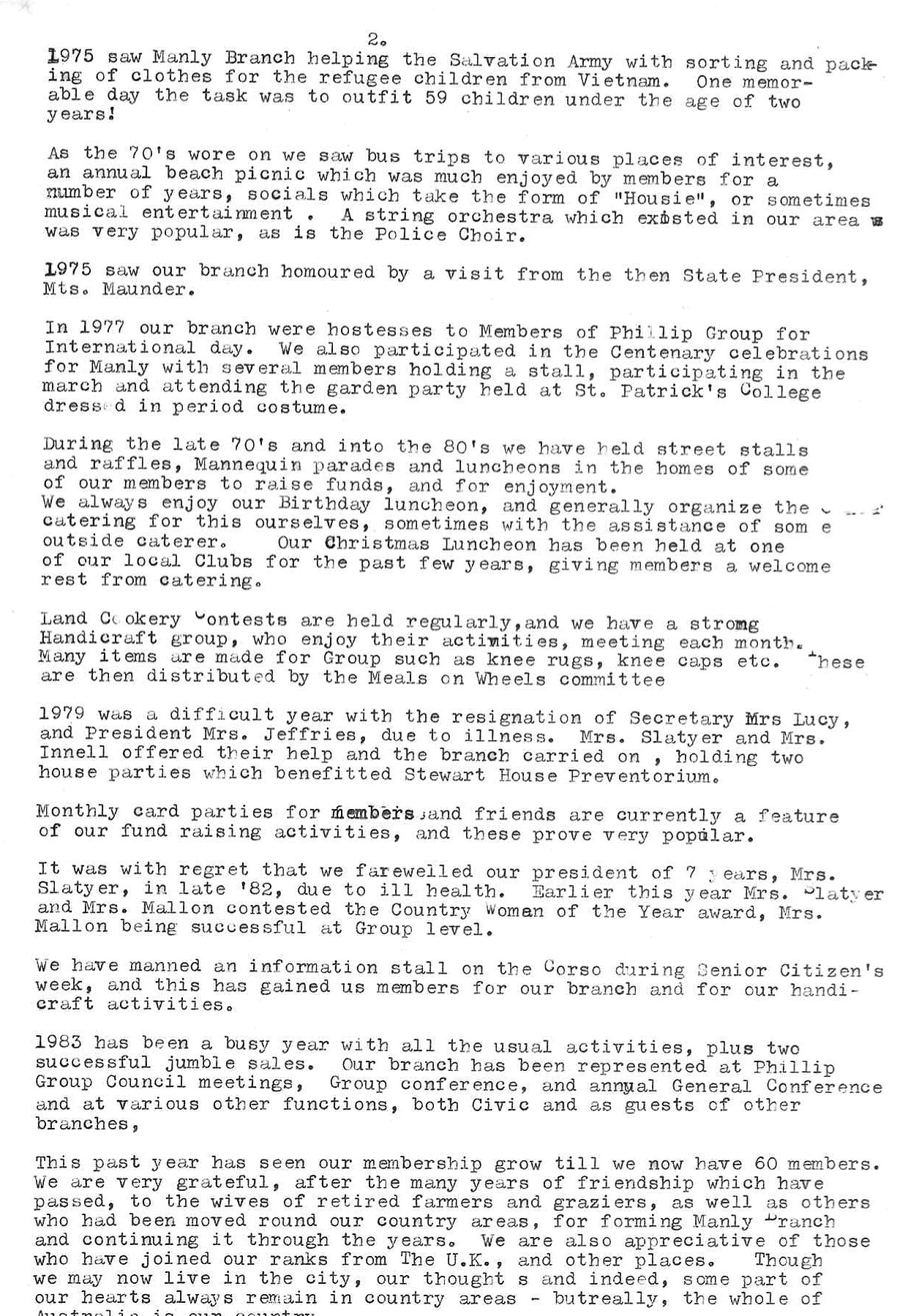
The women of the CWA have been initiators, fighters and lobbyists. They have made localities into communities by providing social activities and educational, recreational and medical facilities, and our CWA Manly Branch has been part of the journey for all of that time.
The Manly to Barrenjoey area may no longer be the food bowl of Sydney it once was but we still have our eyes firmly swinging to those green hills and what lives beyond them. It's like we say here, and have since leaving the country to move to Pittwater - you can take the girl out of the country but you can't take the country out of the girl!
And then there's those scones .....
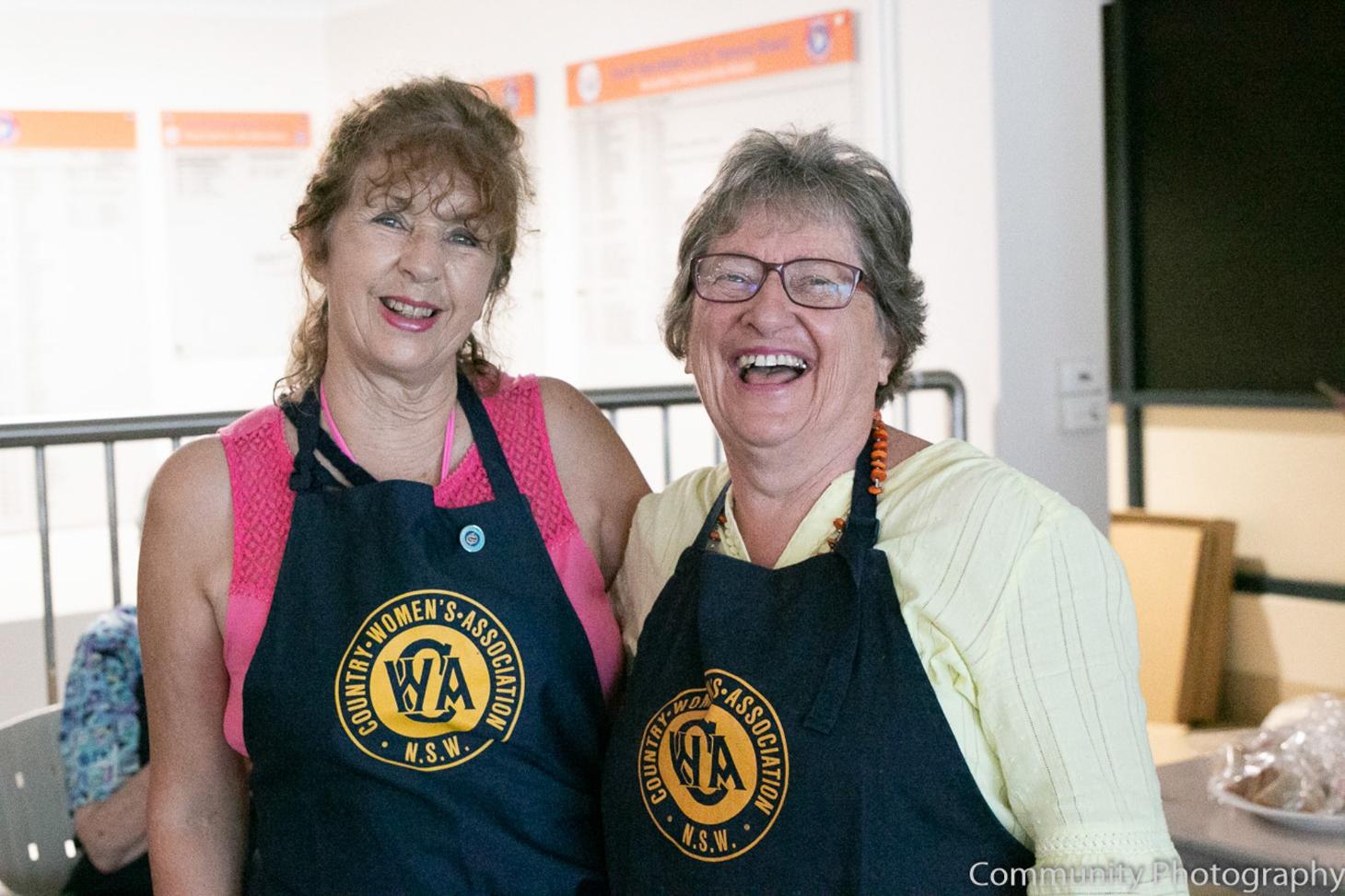
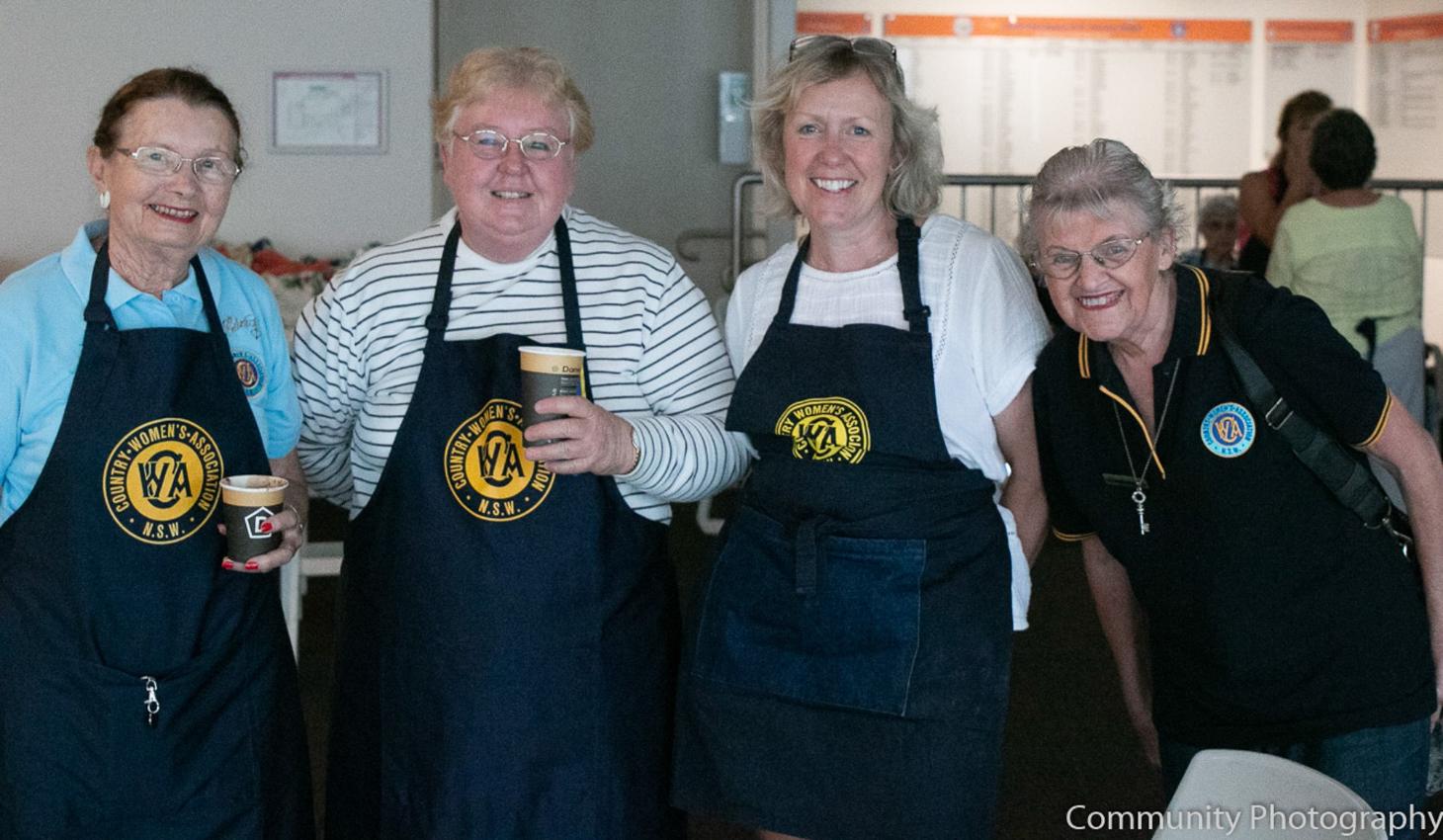
Sources used to compile this page:
- Townsend, Helen, Serving the country : the history of the Country Women's Association of New South Wales, Doubleday, Sydney, 1988, 248 pp; http://www.cwaofnsw.org.au.
- Women in Australia Biographies
- TROVE - National Library of Australia
- The State Library of NSW
- Diana Whitton, Member CWA Manly Branch
Florence Gordon - of Tasmania and Newport: a few notes
A Southern Worker.
MISS FLORENCE GORDON is a well-known worker of the Country Women's Association of New South Wales She acted as hon. organiser of the first open conference in that State, and also held the position of hon. secretary to the first executive committee. She was also hon. secretary to the provisional committee in 1922. Miss Gordon has played an important part in the establishment of the C.W.A in New South Wales, and a great debt of gratitude is due to her, for to her lot fell a great deal of the hardest spade work although her connection with the association lasted for only a short period. A Southern Worker. (1928, February 2). The Queenslander (Brisbane, Qld. : 1866 - 1939), p. 50. Retrieved from http://nla.gov.au/nla.news-article22943693
The Late Miss Florence Gordon.
DEATH has claimed one of the great pioneers of the Country Women's Association, Miss Florence Gordon, whose picture appeared in the ."Queenslander" of February 2. She passed away a week ago at Newport, near Sydney and the members have sustained a great loss. The late Miss Gordon helped materially in the formation of this organisation, and acted as a hon. organiser of the first open conference in New South Wales, and also held the office of hon. secretary of the first executive committee, and also hon. secretary to the provisional committee in 1922, so that she played one of the most important parts in bringing together the C.W.A. in Australia.
In 1921 in the "Stock and Station Journal," Sydney, Miss Florence Gordon, under the pen-name of "Urbania," wrote an article headed "A Union of Help for Country Women." The idea put forth in it met with immediate sympathy from many different quarters, with the result that the right women "got together" at the tight time, and in a very short time the Country Association came into being. At a recent meeting of the C.W.A. members stood in silence for a few minutes as a mark of respect to Miss Florence Gordon, who has meant so much in the history of the association. The Late Miss Florence Gordon. (1928, February 23). The Queenslander (Brisbane, Qld. : 1866 - 1939), p. 51. Retrieved from http://nla.gov.au/nla.news-article22944422
OBITUARY.
MISS FLORENCE GORDON.
Miss Florence Gordon, who was instrumental in founding the Country Women's Association, and was for some time its secretary, died on Tuesday afternoon at her residence, "The Combers," Newport. Miss Gordon was well-known as a freelance journalist, and was a regular contributor to the "Sydney Morning Herald," under the initials, F.G., for a number of years. Her earlier journalistic experience was on the staff of the Tamworth "Observer."
She was a native of Launceston, Tasmania. The funeral took place yesterday afternoon at the Rookwood Crematorium, Rev. A. H. Garnsey conducting the service. Among the floral tributes were wreaths from the Country Women's Association, the Society of Women Writers, and the staff of "The Combers." OBITUARY. (1928, February 2). The Sydney Morning Herald (NSW : 1842 - 1954), p. 13. Retrieved from http://nla.gov.au/nla.news-article16438570
NSW BDM’s: GORDON FLORENCE M W 3594/1928 listing her parents as CHARLES and ANNE C MANLY,.
Florence's parents married December 15th, 1851, her mother signing the registry with an 'x' mark.

Her father passed away in 1890
GORDON. - In memory of Charles Gordon, died July 1, 1890.
'Gone, but not forgotten.'
— Inserted by his loving wife and children. Family Notices (1901, July 1). Daily Telegraph (Launceston, Tas. : 1883 - 1928), p. 1. Retrieved from http://nla.gov.au/nla.news-article157737462
GORDON.-The Relatives and Friends of the late FLORENCE GORDON are kindly invited to attend the Cremation of her remains, which will take place at the Crematorium, Rookwood, THIS (Wednesday) AFTERNOON, immediately after a short service. which will commence at 3 p.m., at the Crematorium. Friends travelling by Funeral train alight at no. 4 Mortuary in the Cemetery, and proceed direct to the Crematorium. CHARLES KINSELA, Funeral Director. Family Notices (1928, February 1). The Sydney Morning Herald (NSW : 1842 - 1954), p. 13. Retrieved from http://nla.gov.au/nla.news-article16438358
In the Supreme Court of New South Wales.
PROBATE JURISDICTION.
In the matter of the estate of Florence Mary White Gordon, late of Newport, near Sydney, in the State of New South Wales, spinster, deceased.
PURSUANT to the Wills, Probate and Administration Act, 1898, the Testator's Family Maintenance and Guardianship of Infants Act, 1916, and the Trustee Act, 1925: Notice is hereby given that every creditor or other person having any debt or claim upon or affecting the estate of the abovenamed- deceased, who died on or about the 31st day of January, 1928, and letters of administration with the will annexed were, on the 23rd day of May, 1928, granted by the Supreme Court of New South Wales to the Public Trustee, is hereby required to send in particulars in writing of such debt or claim to the said Public Trustee, on or before the 9th day of August, 1928, at the expiration of which time the said Public Trustee will proceed to convey and distribute the property and assets of the said deceased to or among the persons entitled thereto, having regard only to the debts or claims of which he then has notice; and notice is hereby further given that the said Public Trustee will not be liable, for the property or assets or any part thereof so conveyed or distributed, to any person of whose debt or claim he shall not have had notice at the time of such conveyance or distribution.
E. J. PAYNE, Culwulla Chambers, ' Public Trustee. 67 Castlereagh-street, Sydney, 8th June, 1928. PROBATE JURISDICTION. (1928, June 8). Government Gazette of the State of New South Wales (Sydney, NSW : 1901 - 2001), p. 2717. Retrieved from http://nla.gov.au/nla.news-article219944886